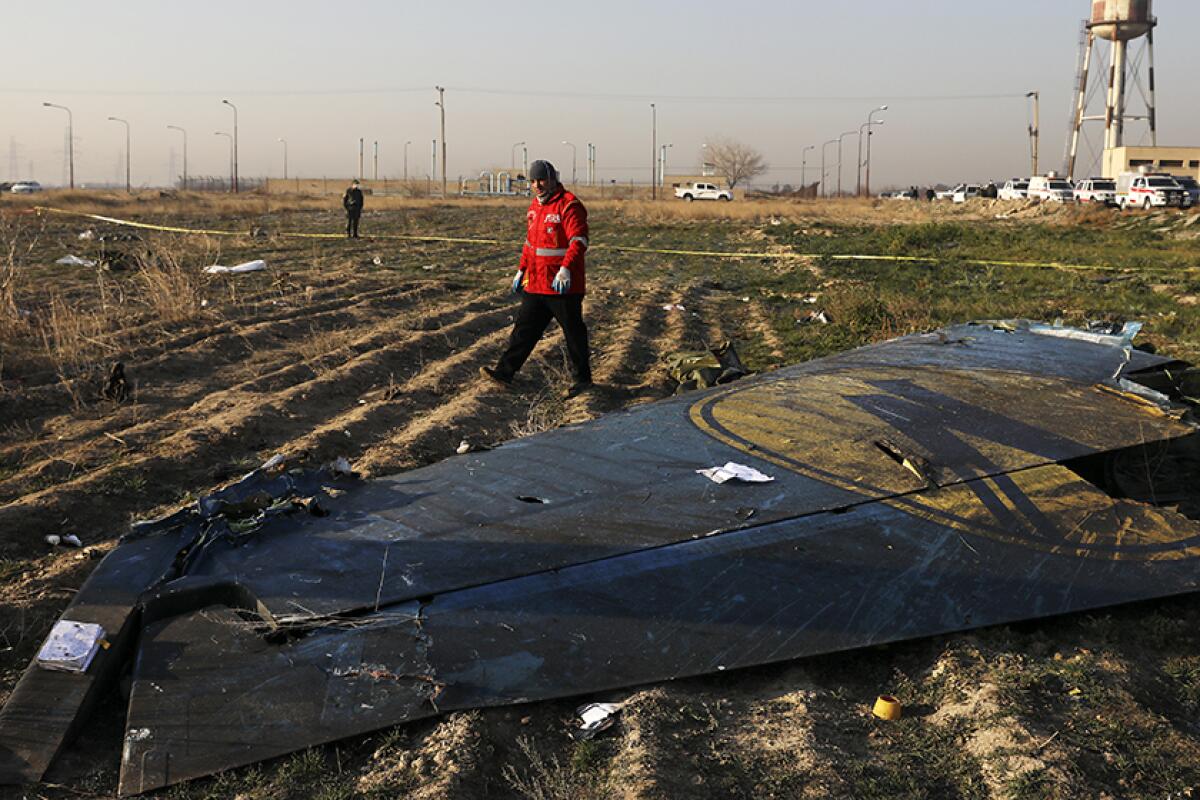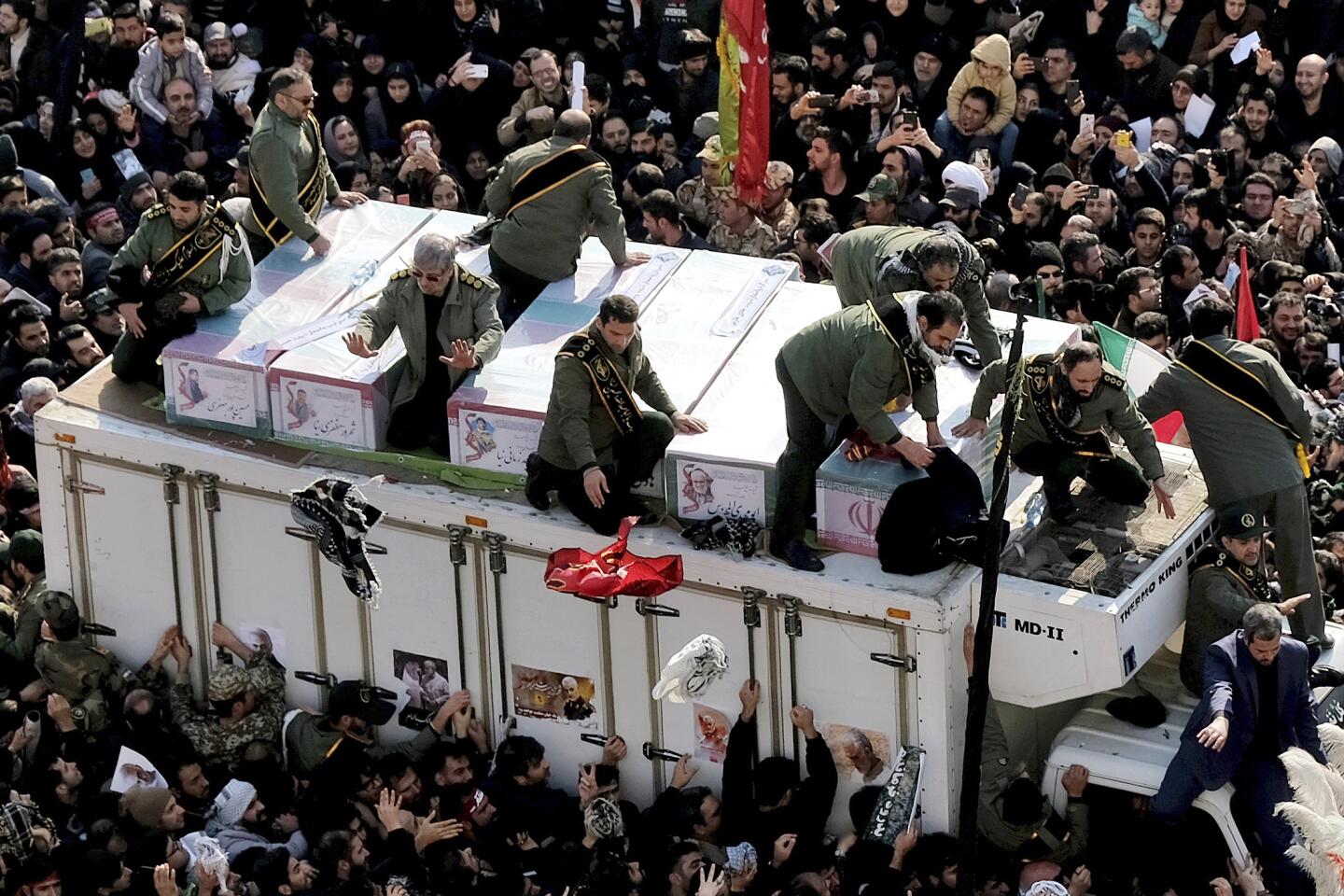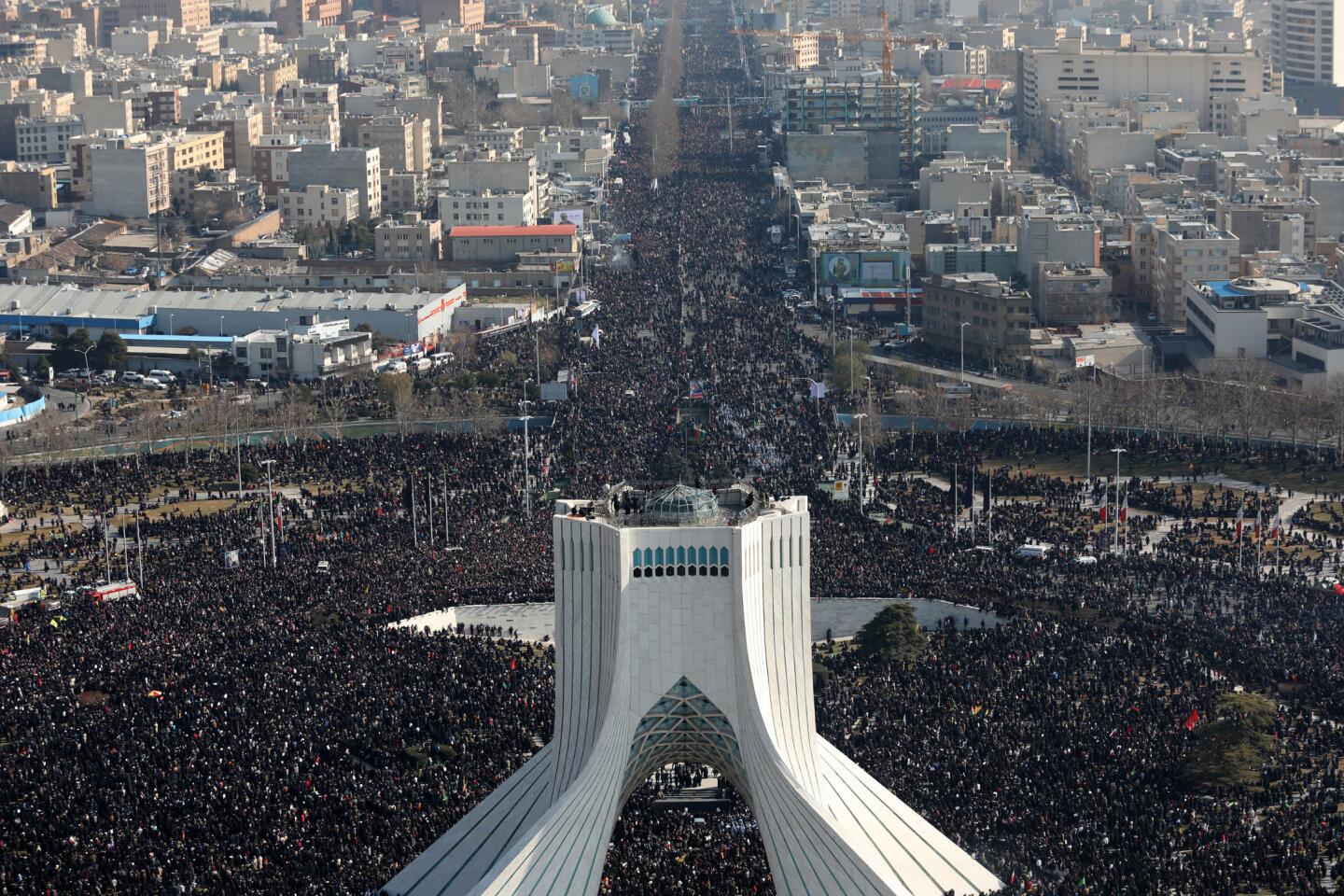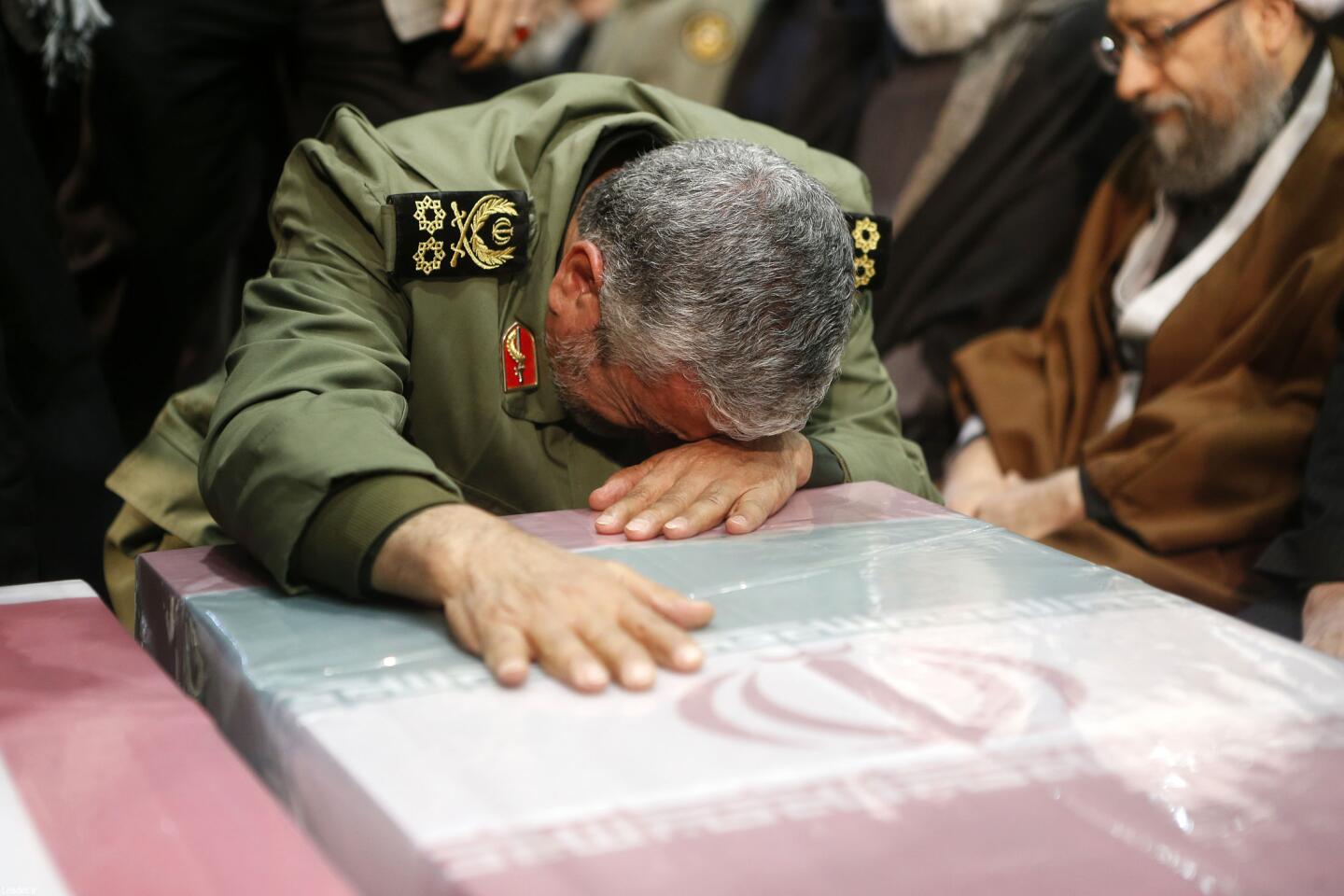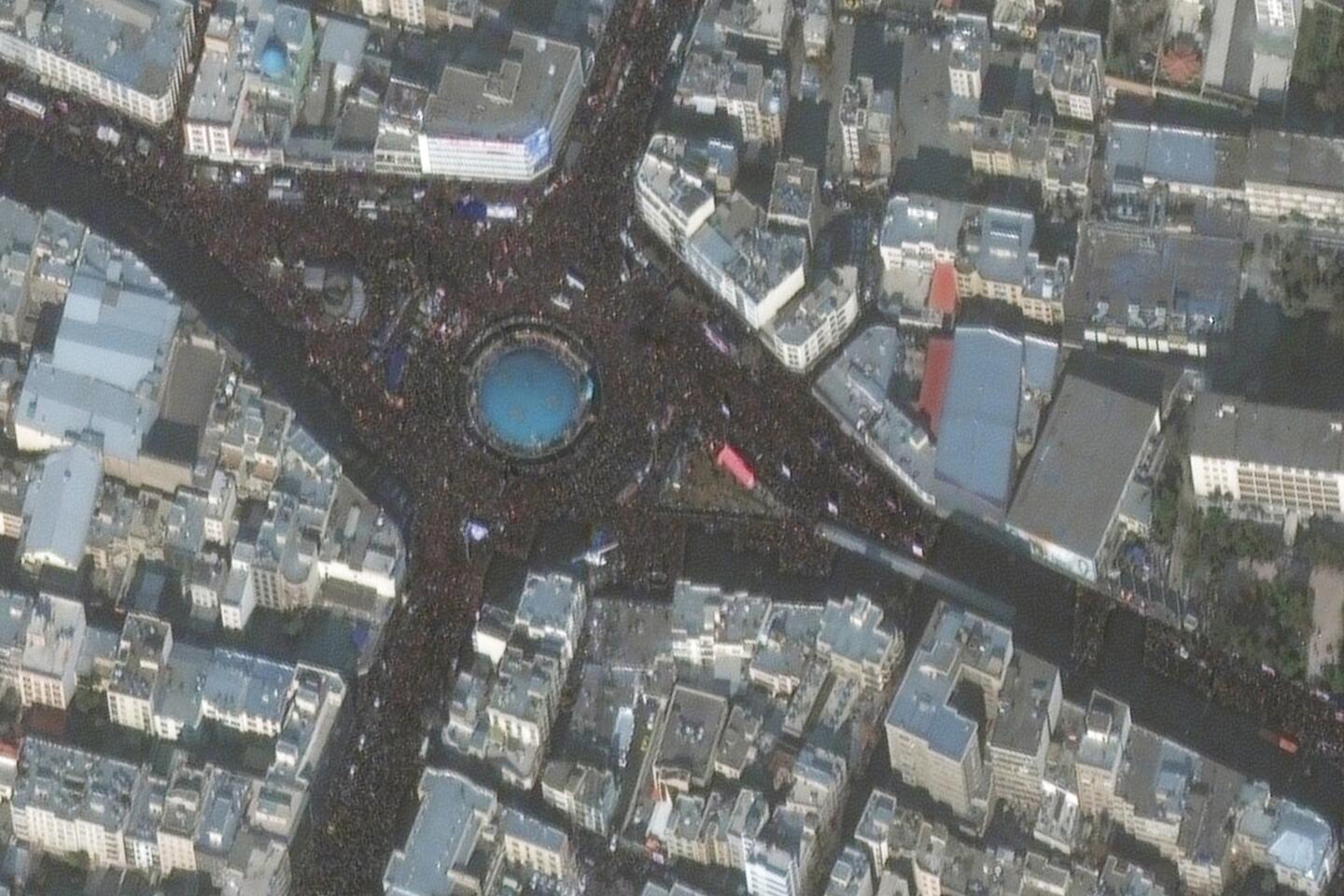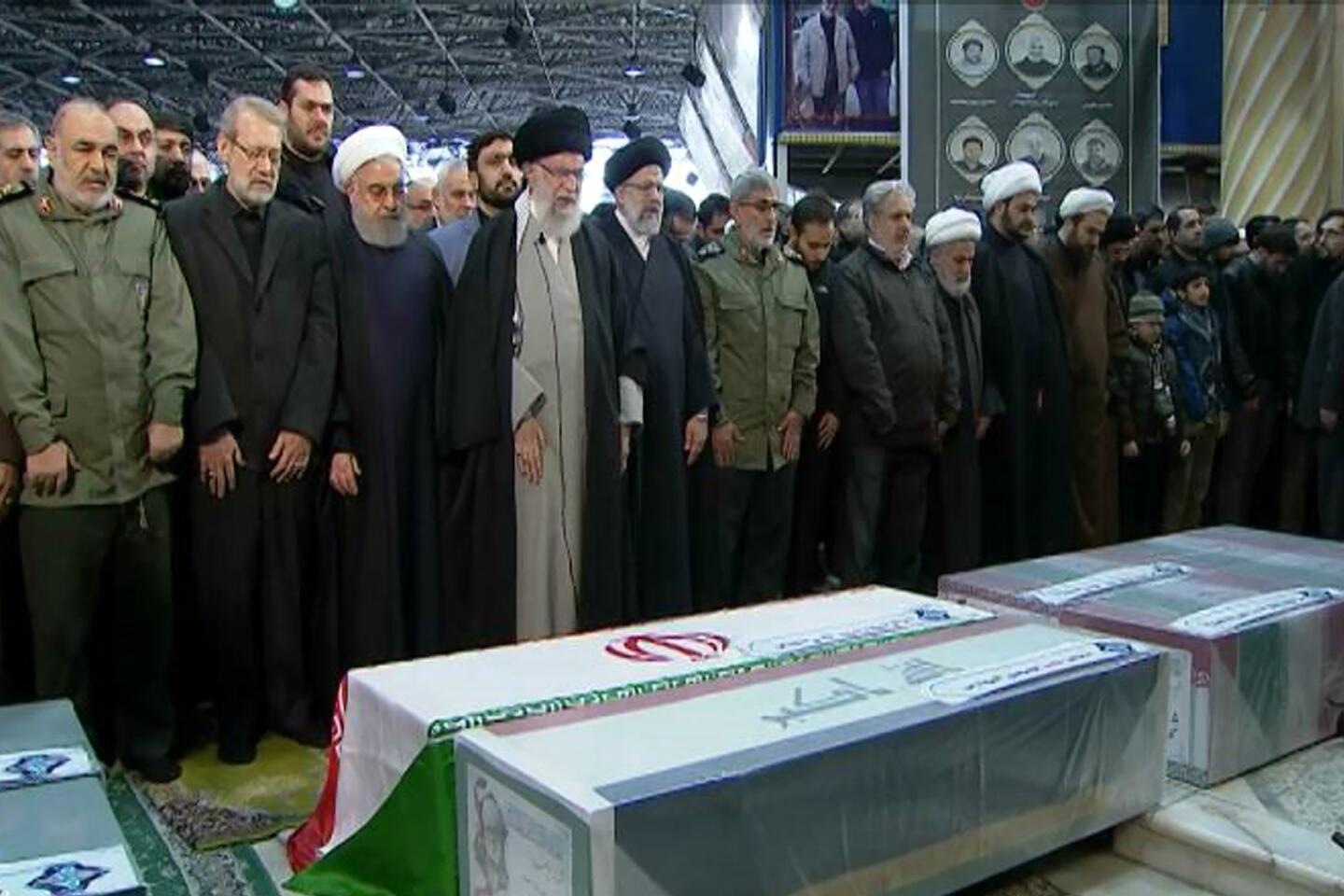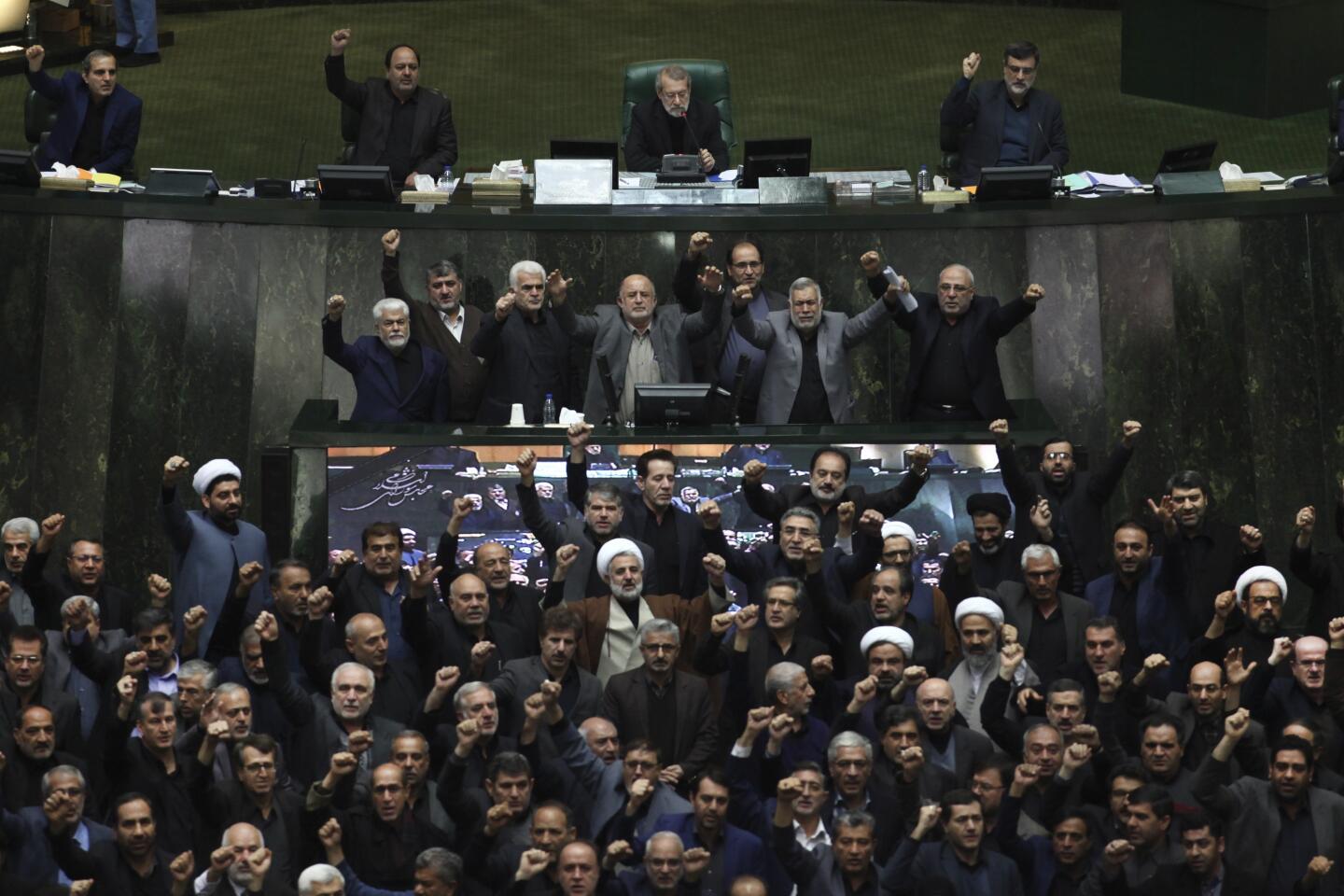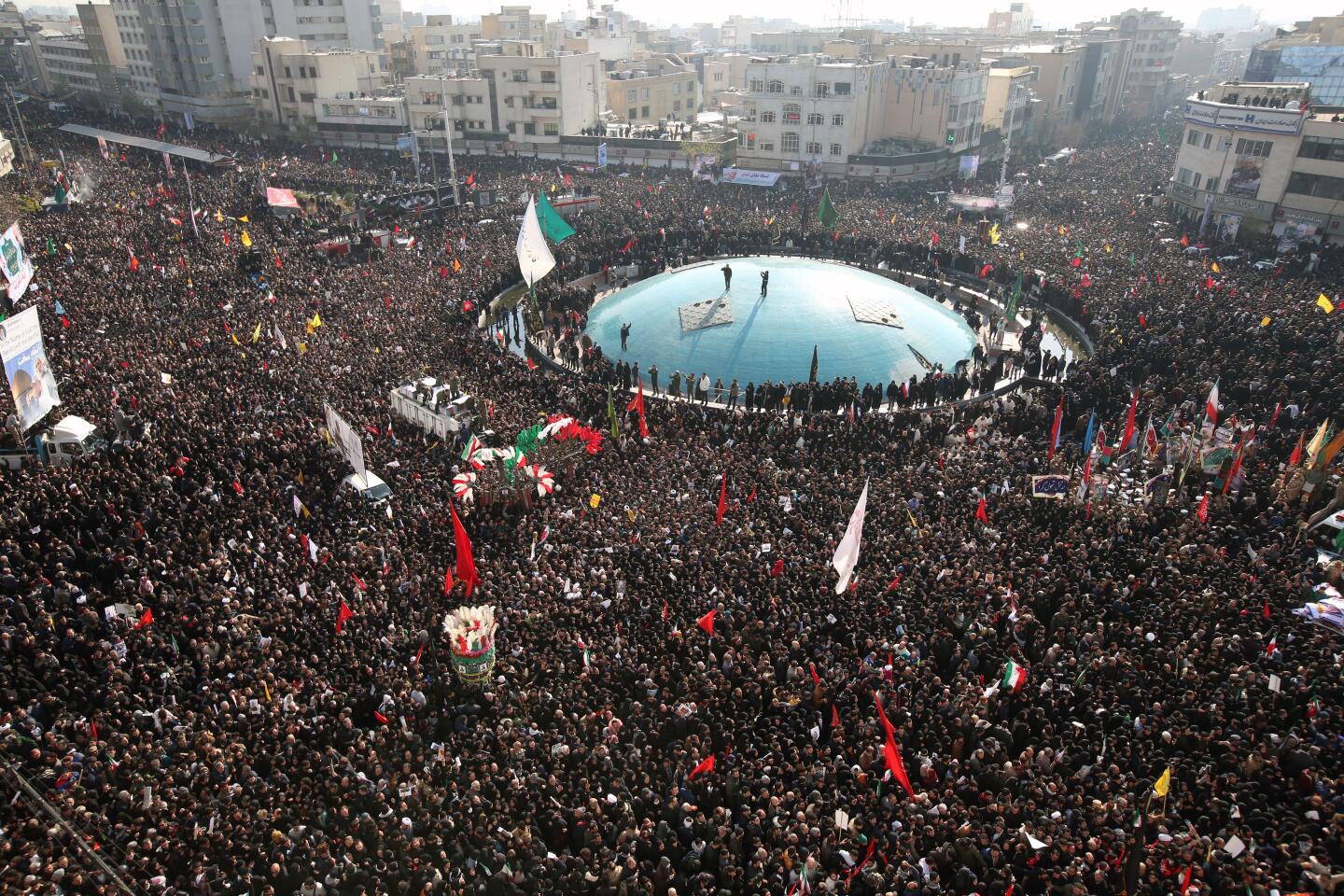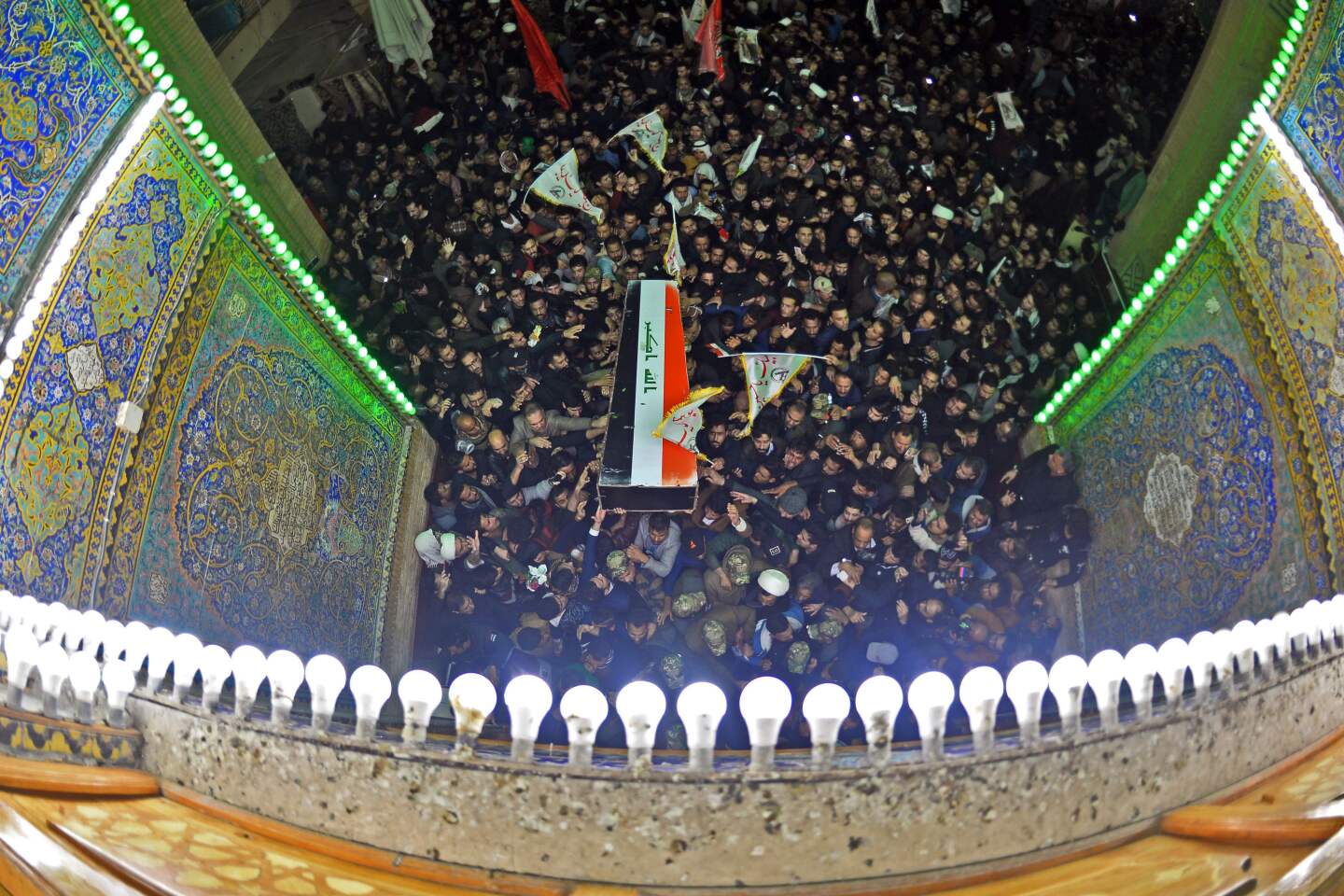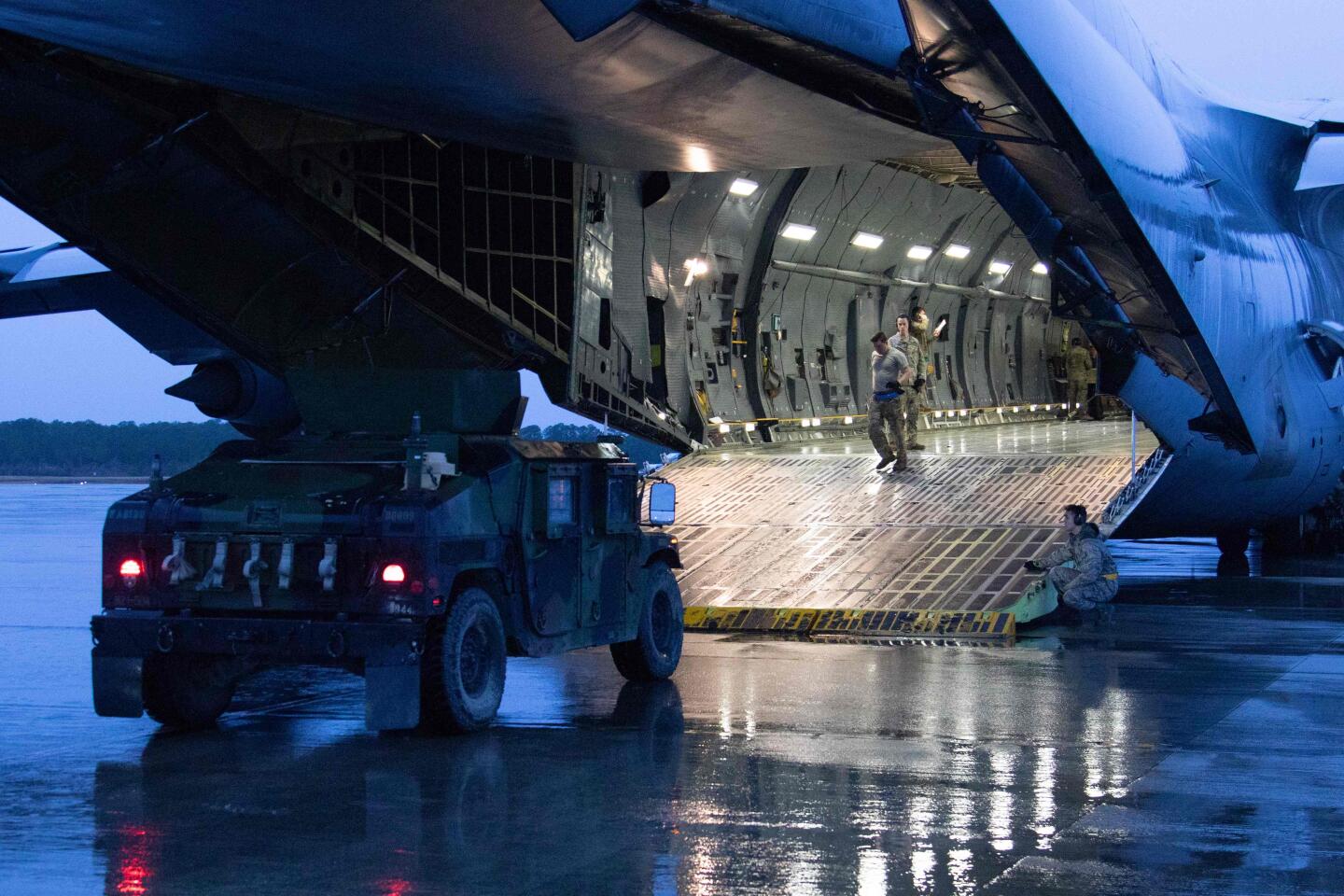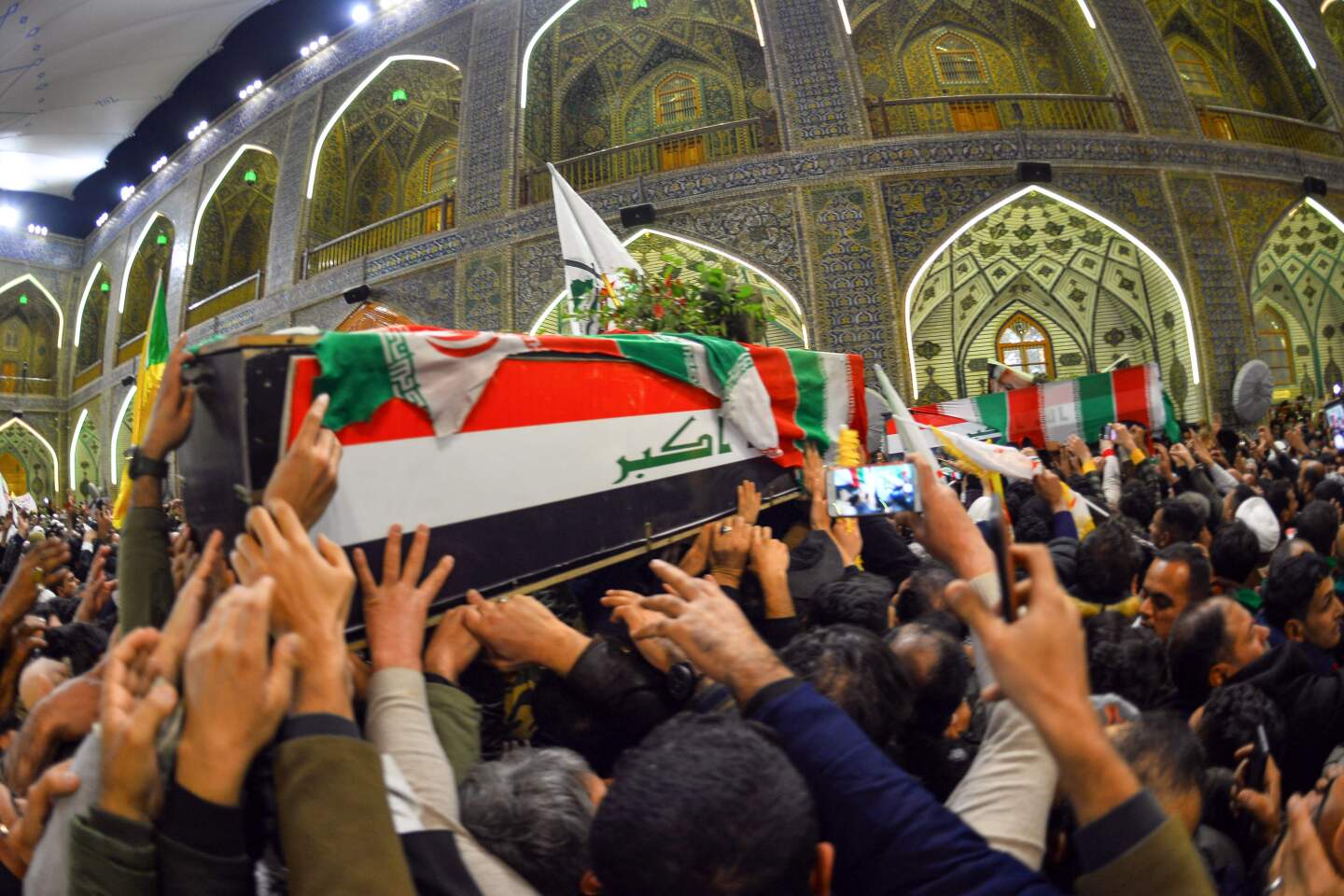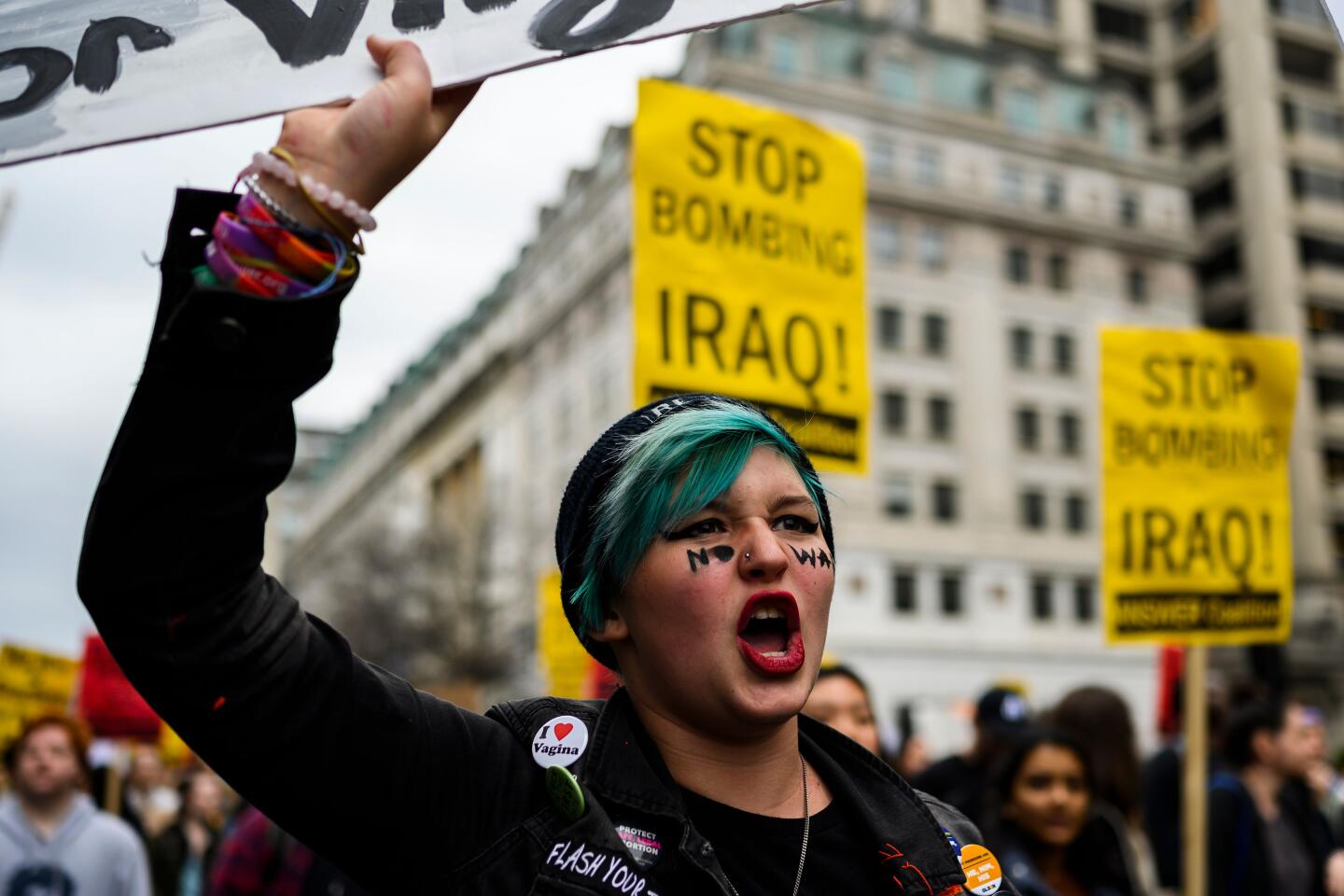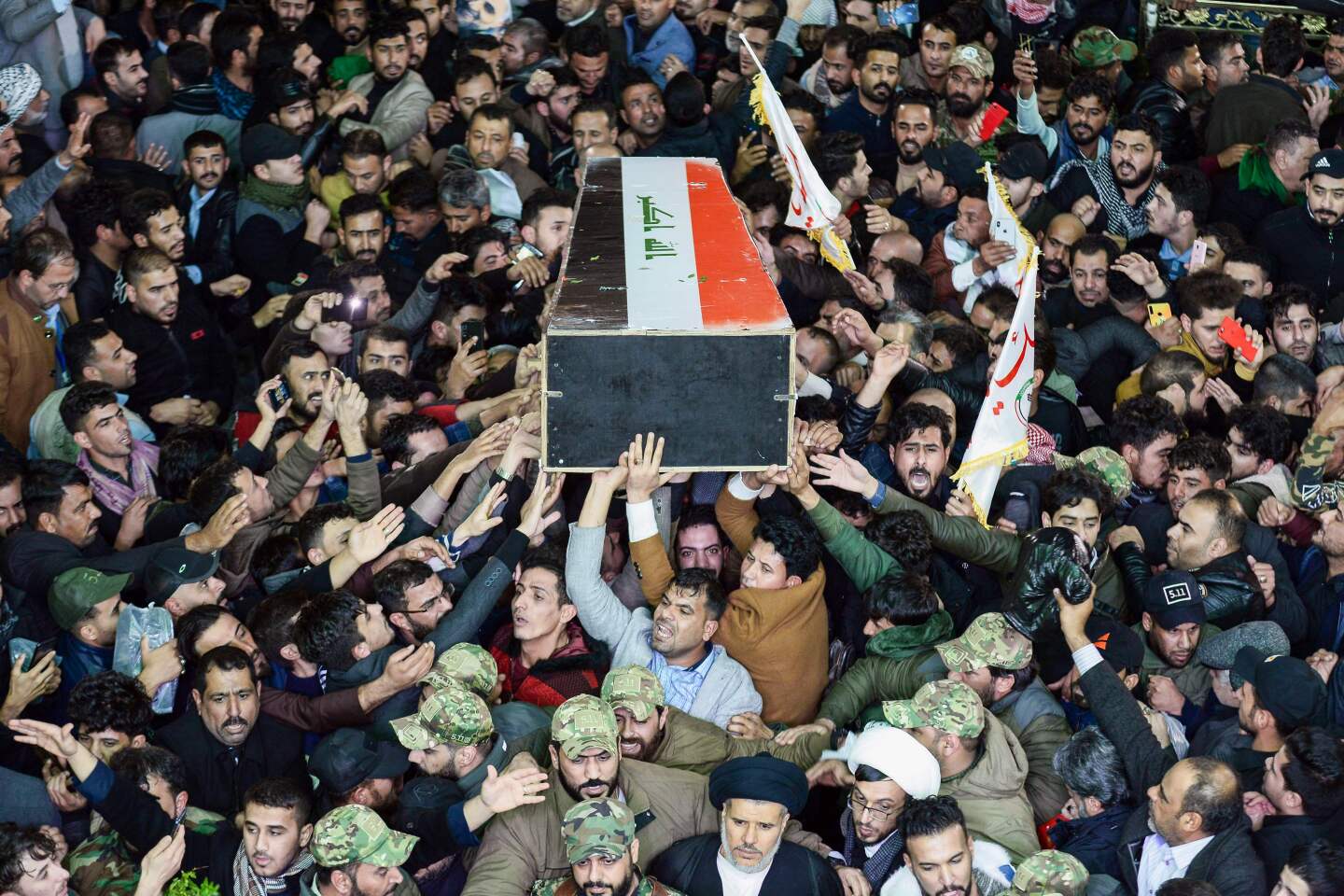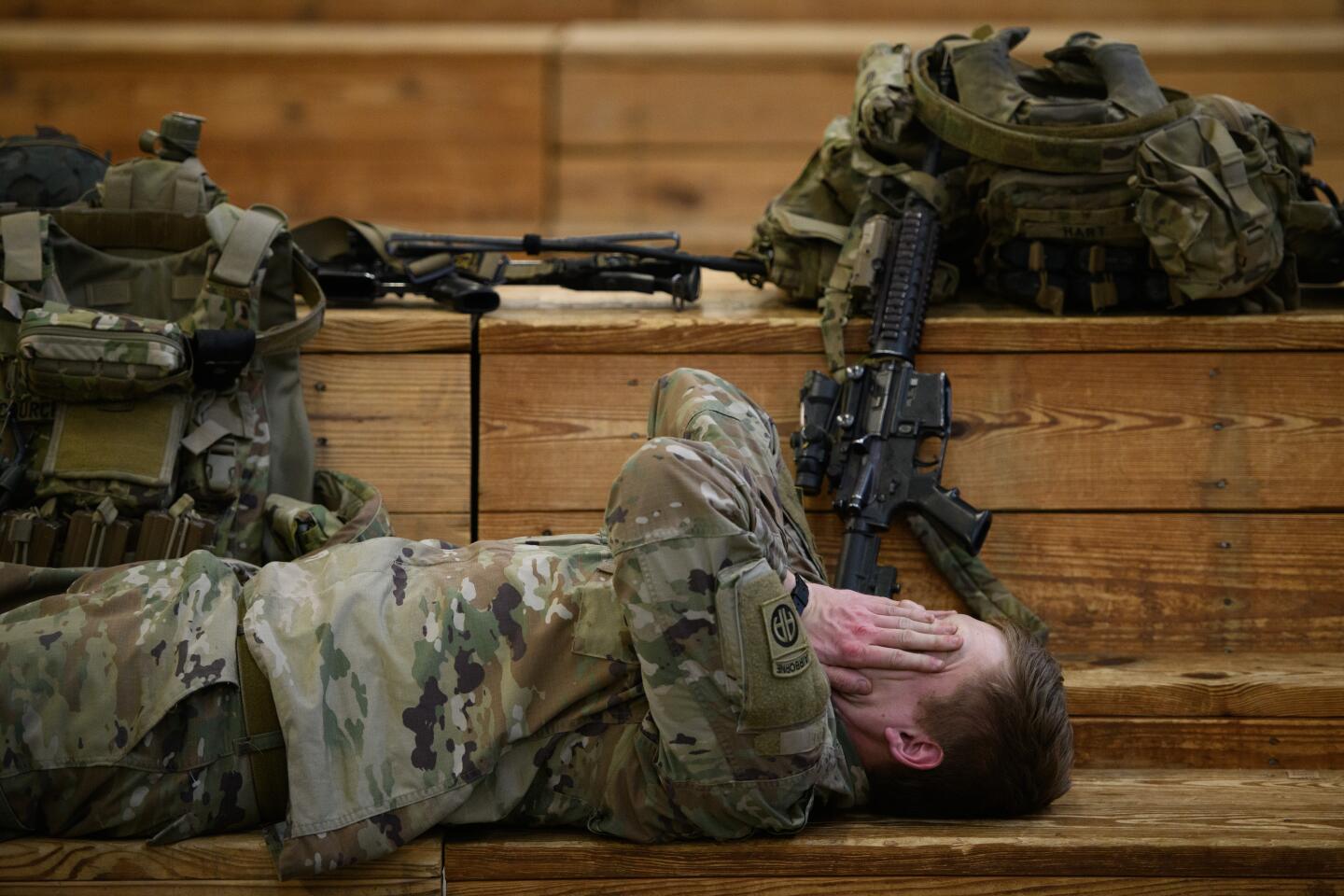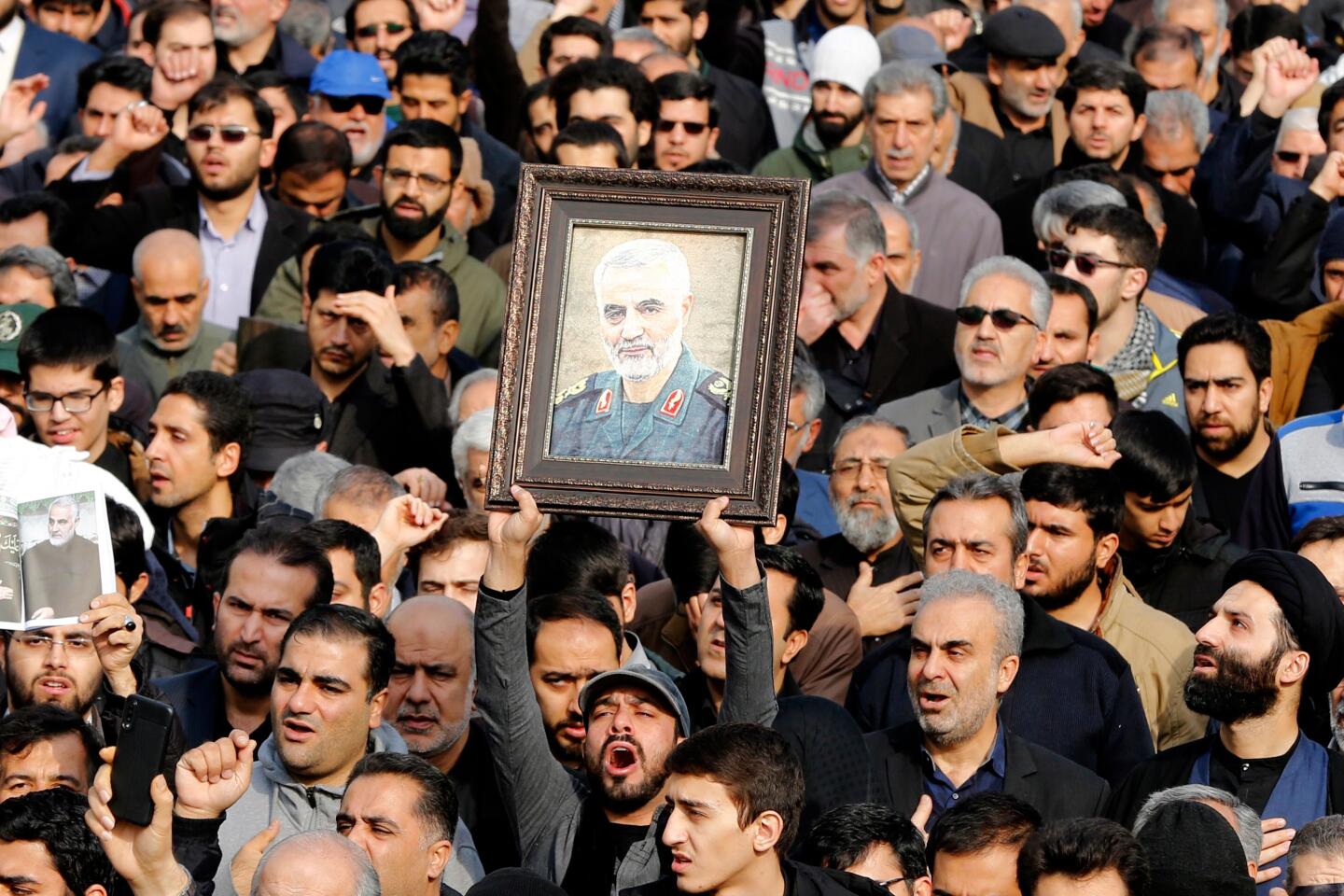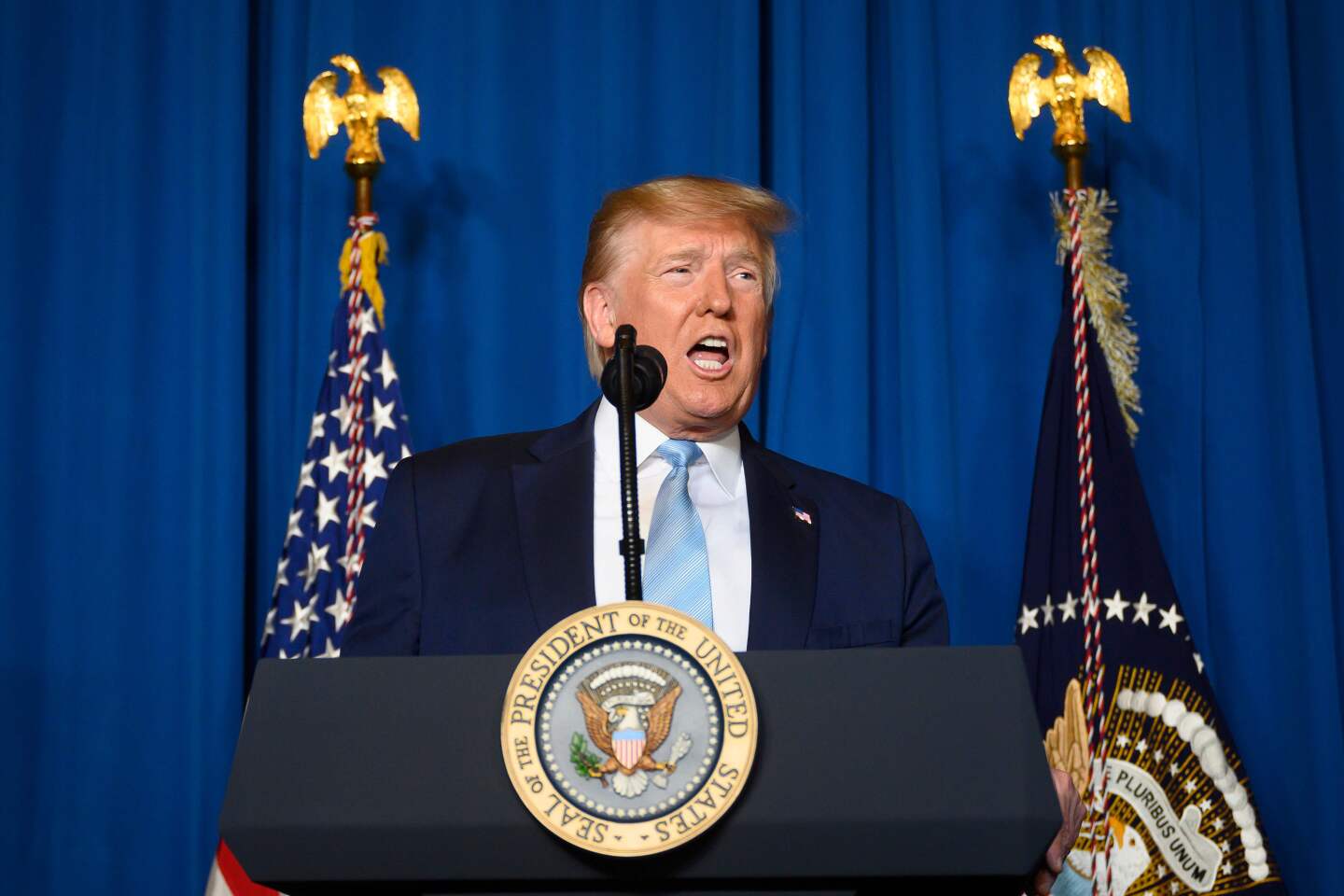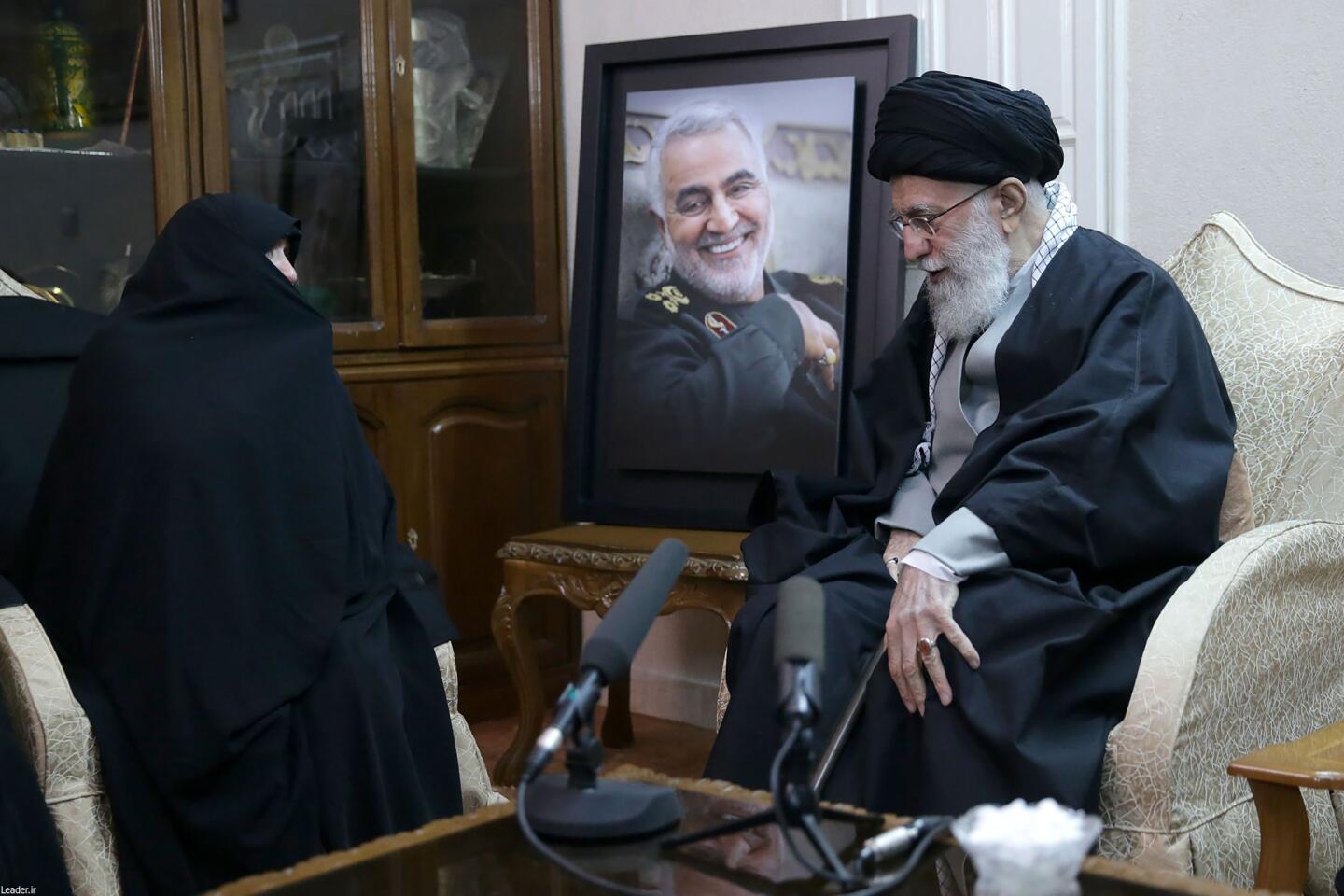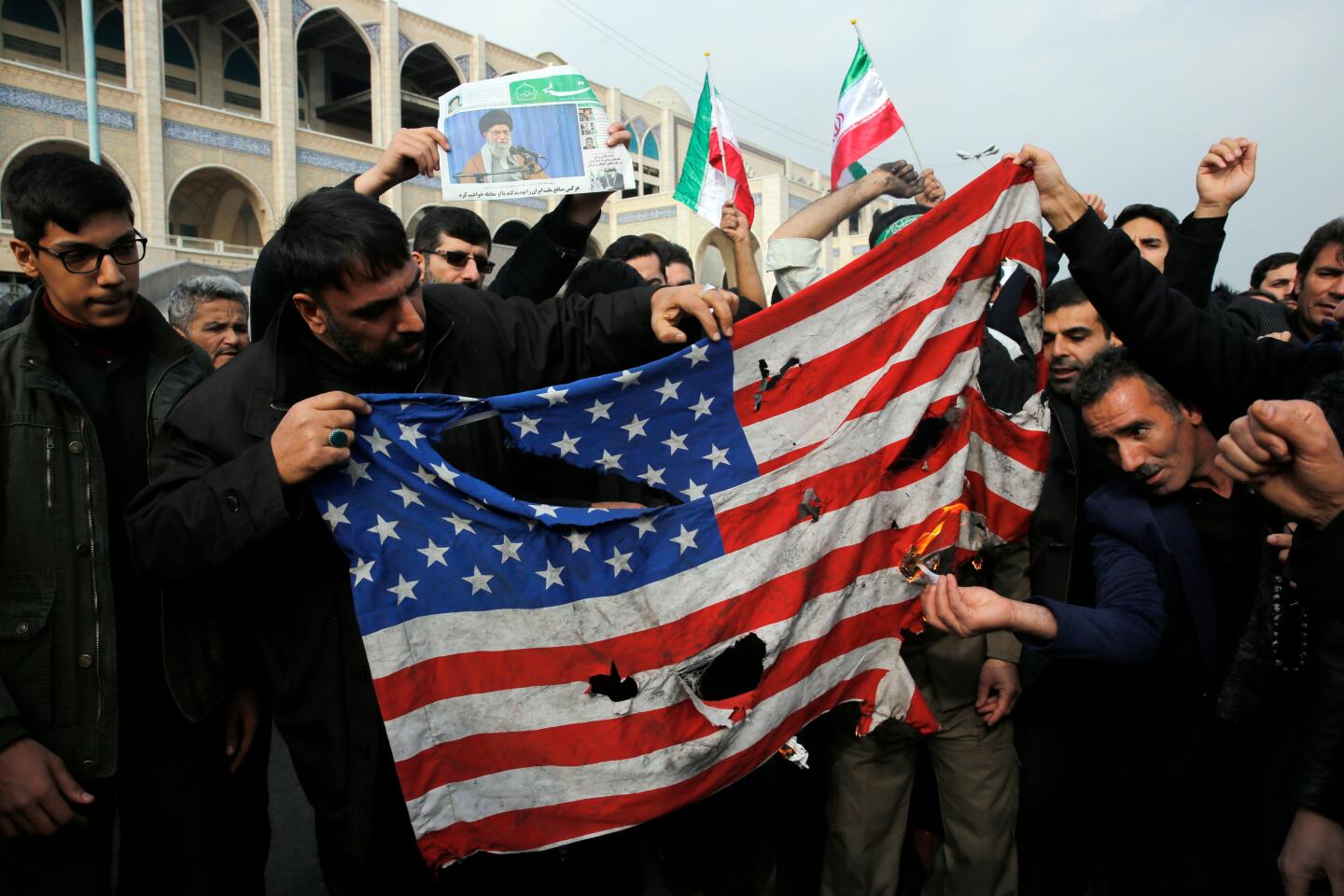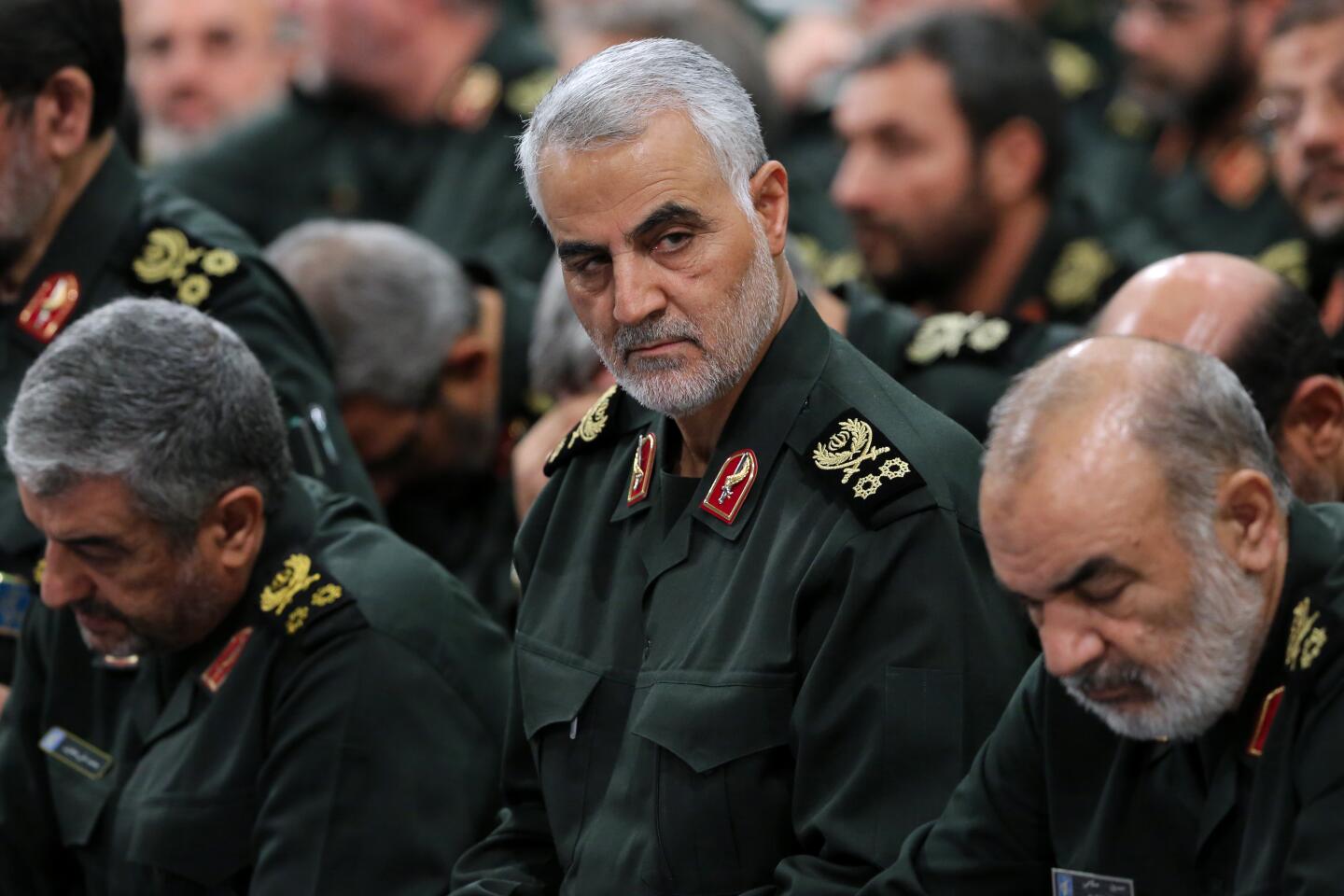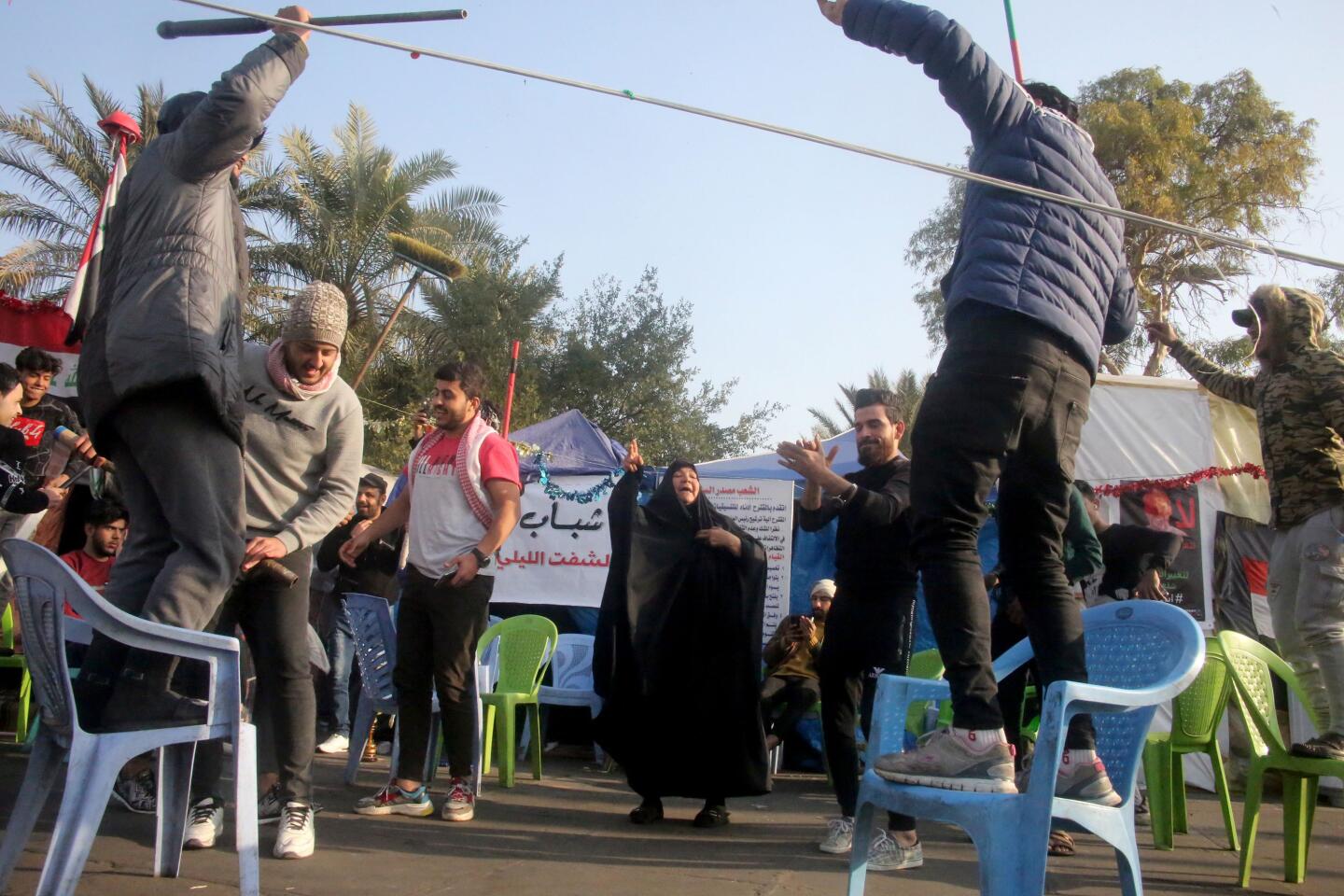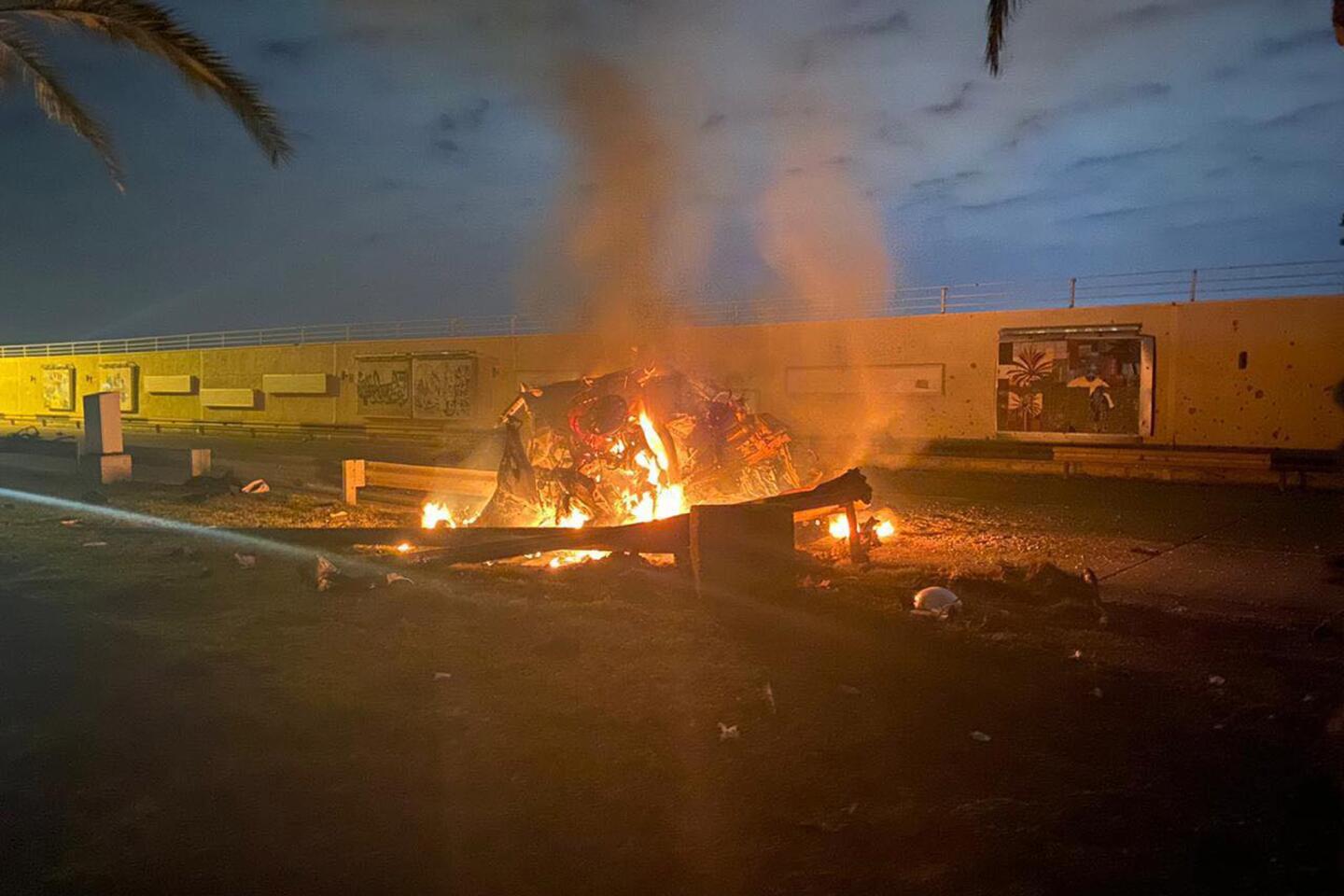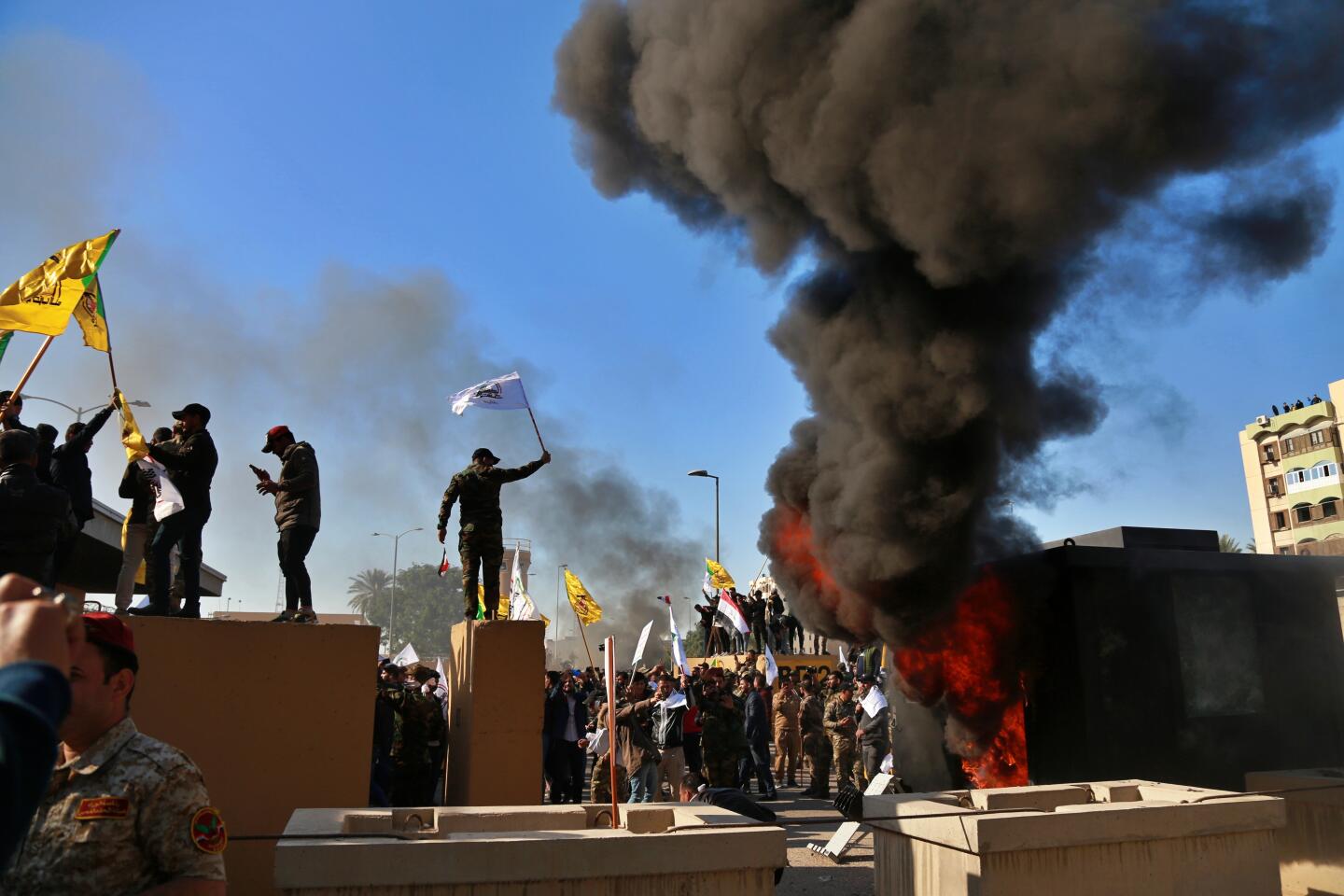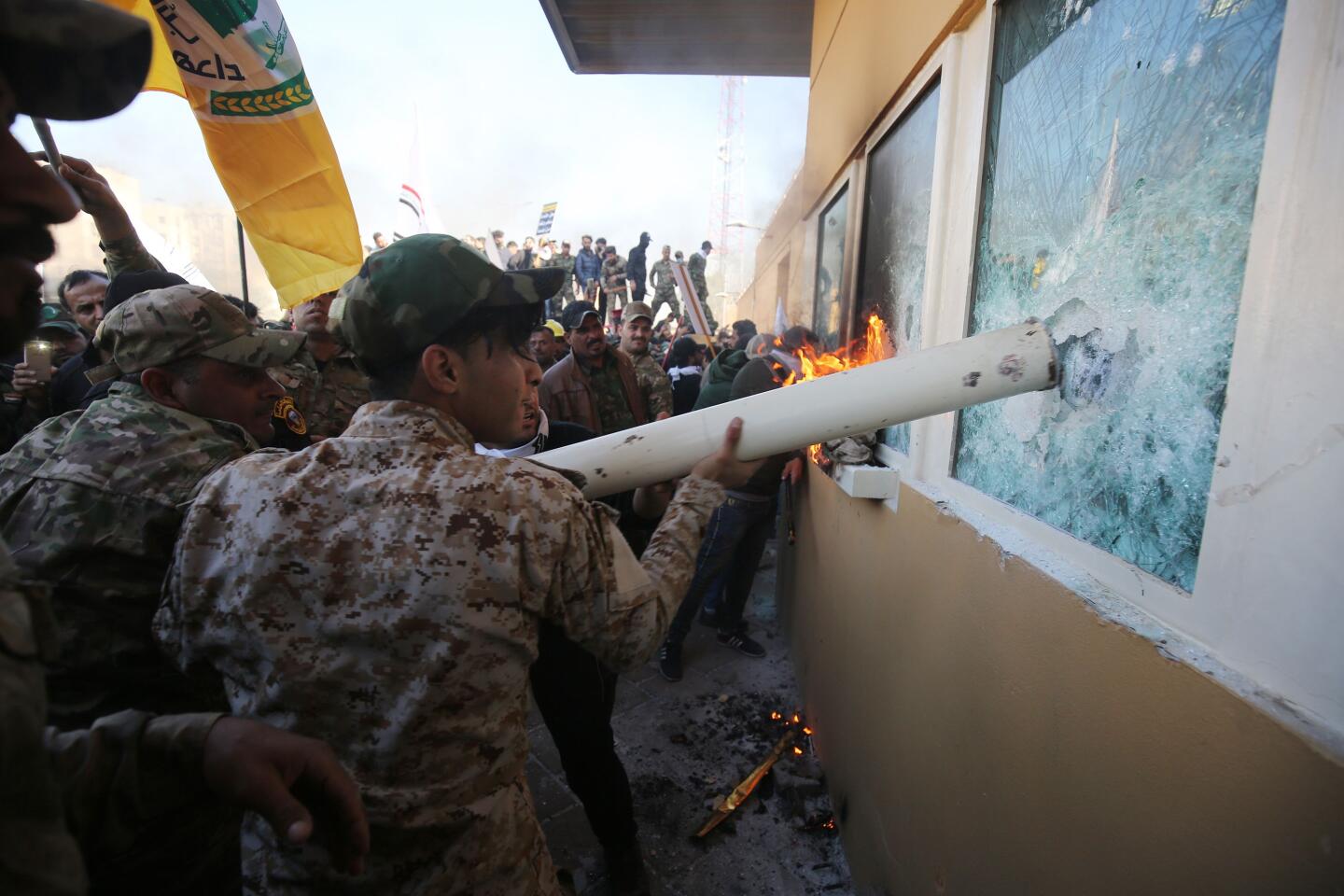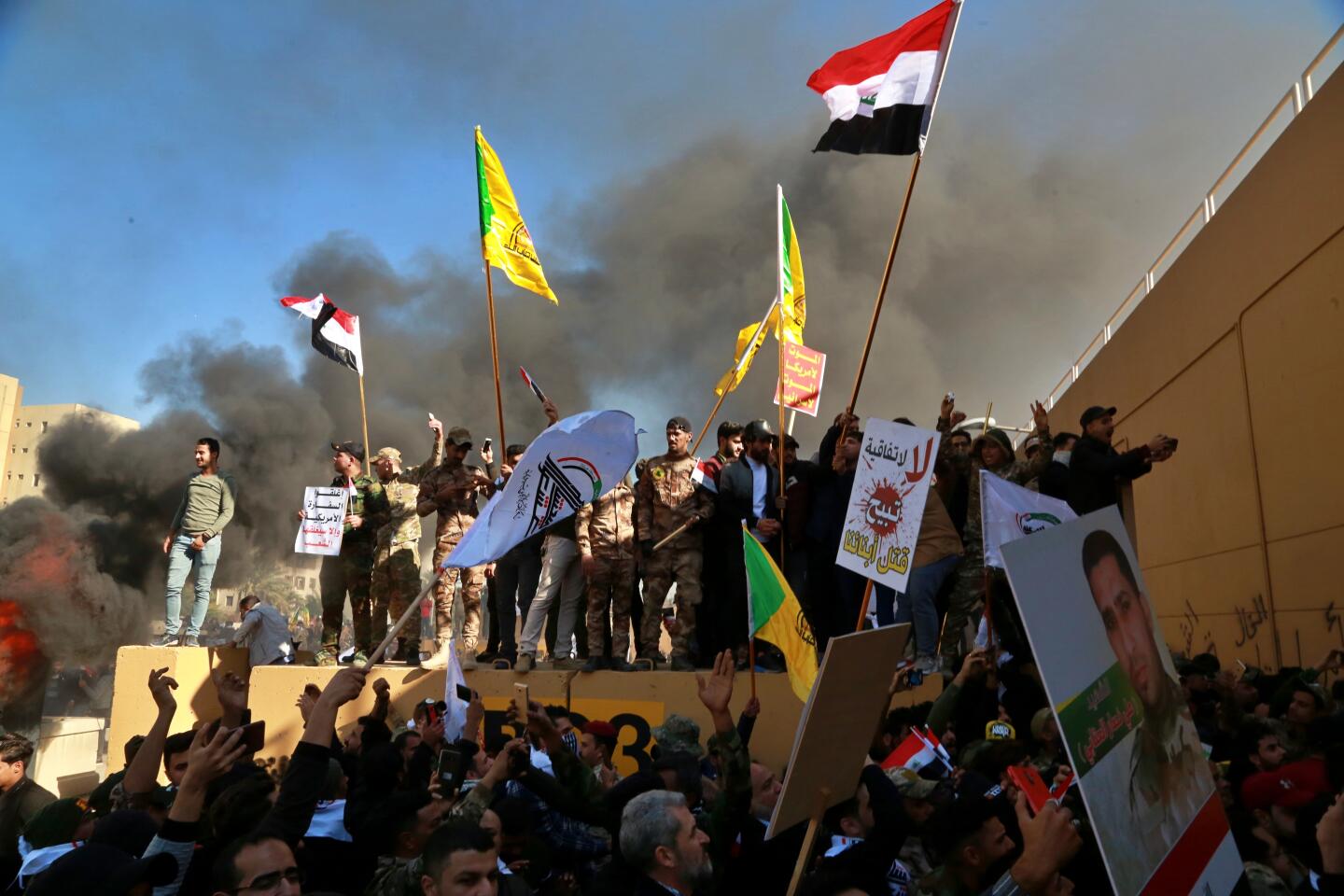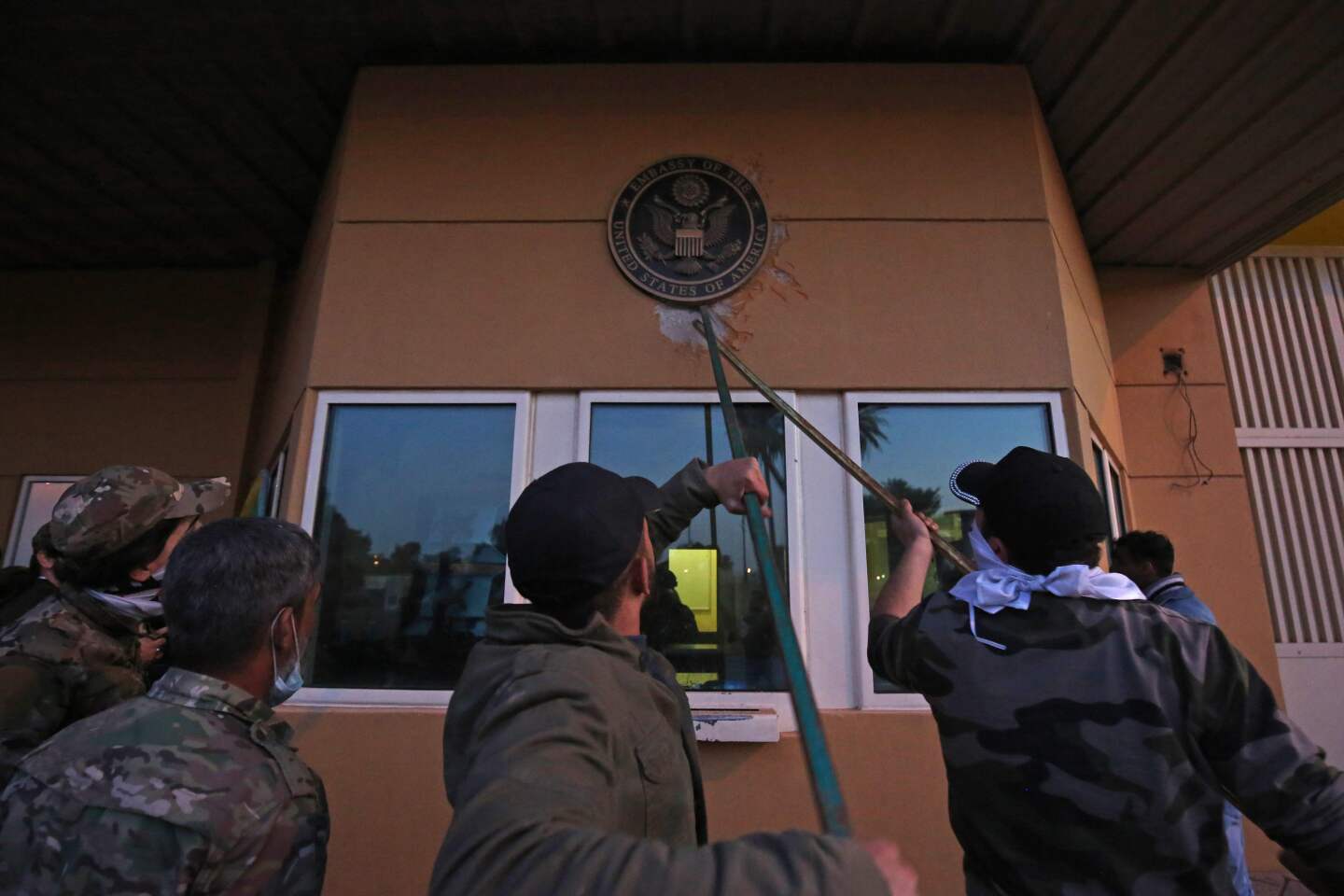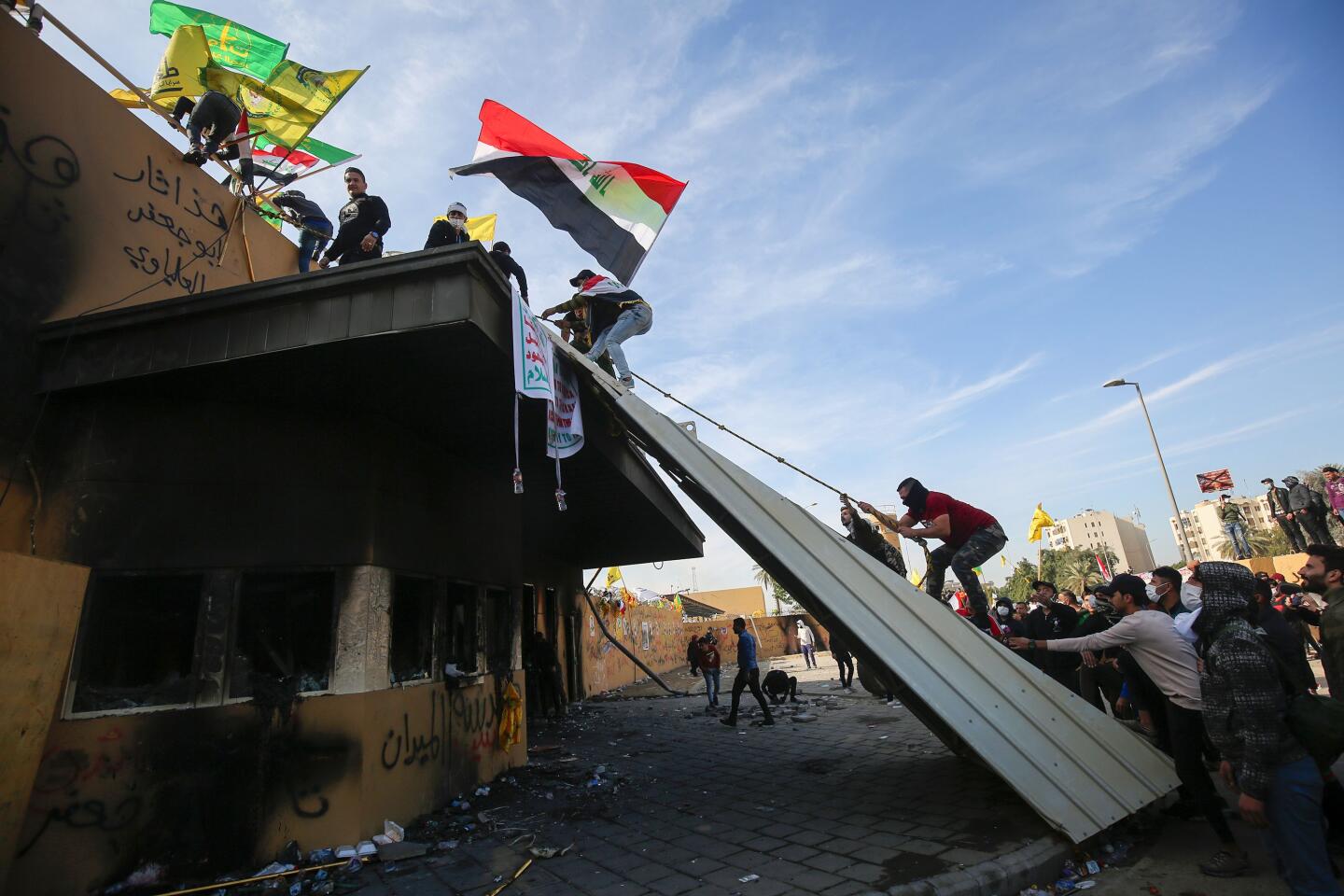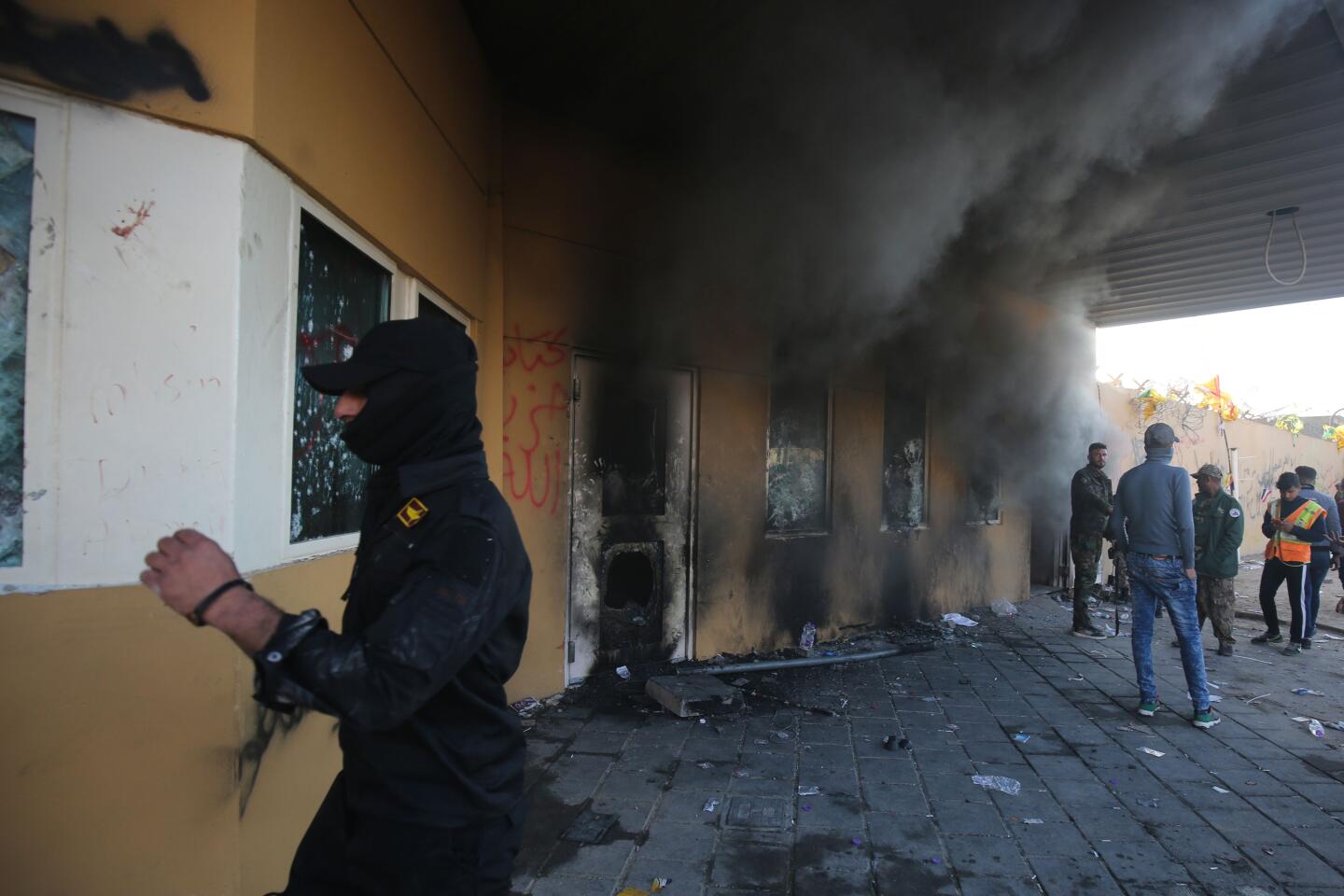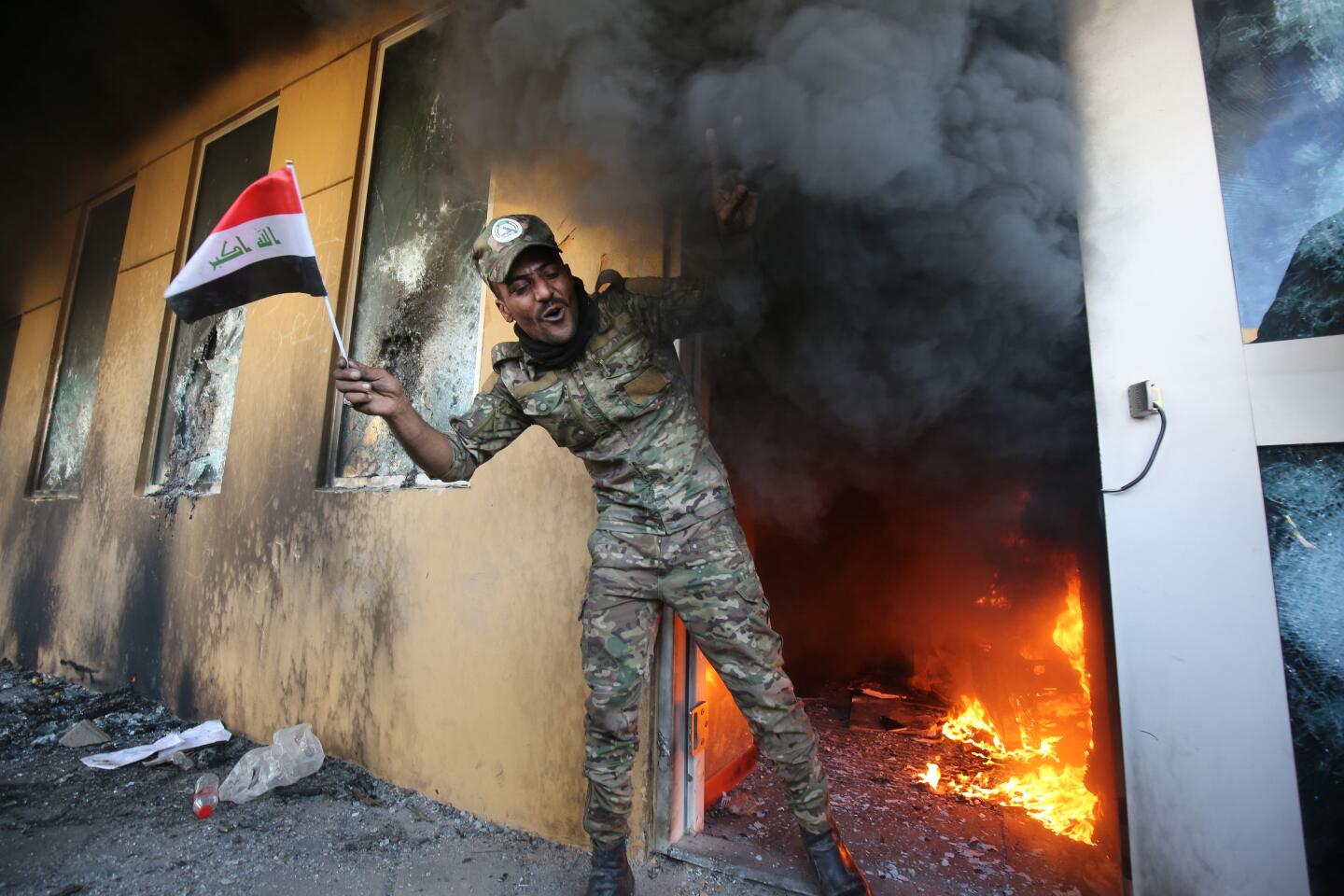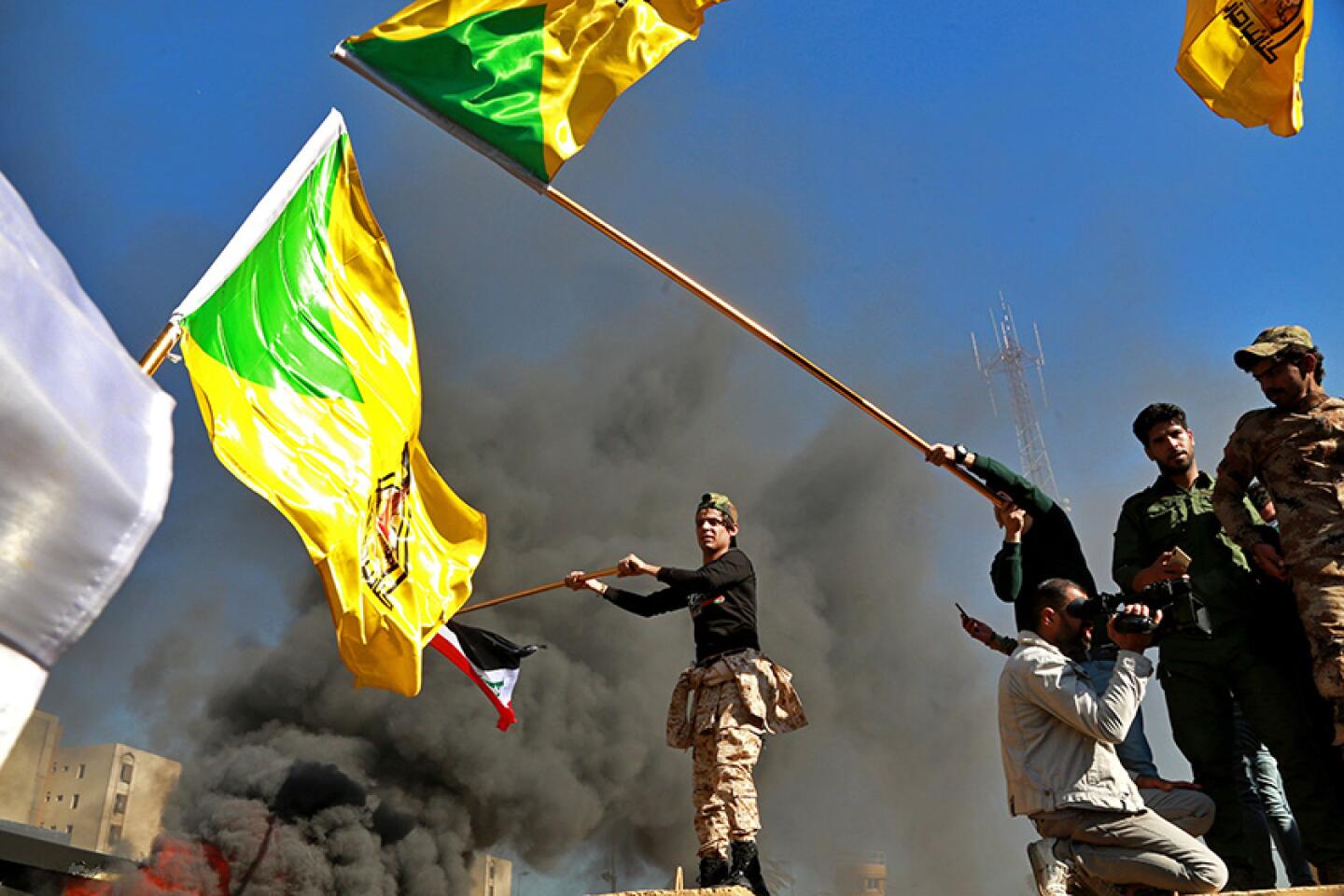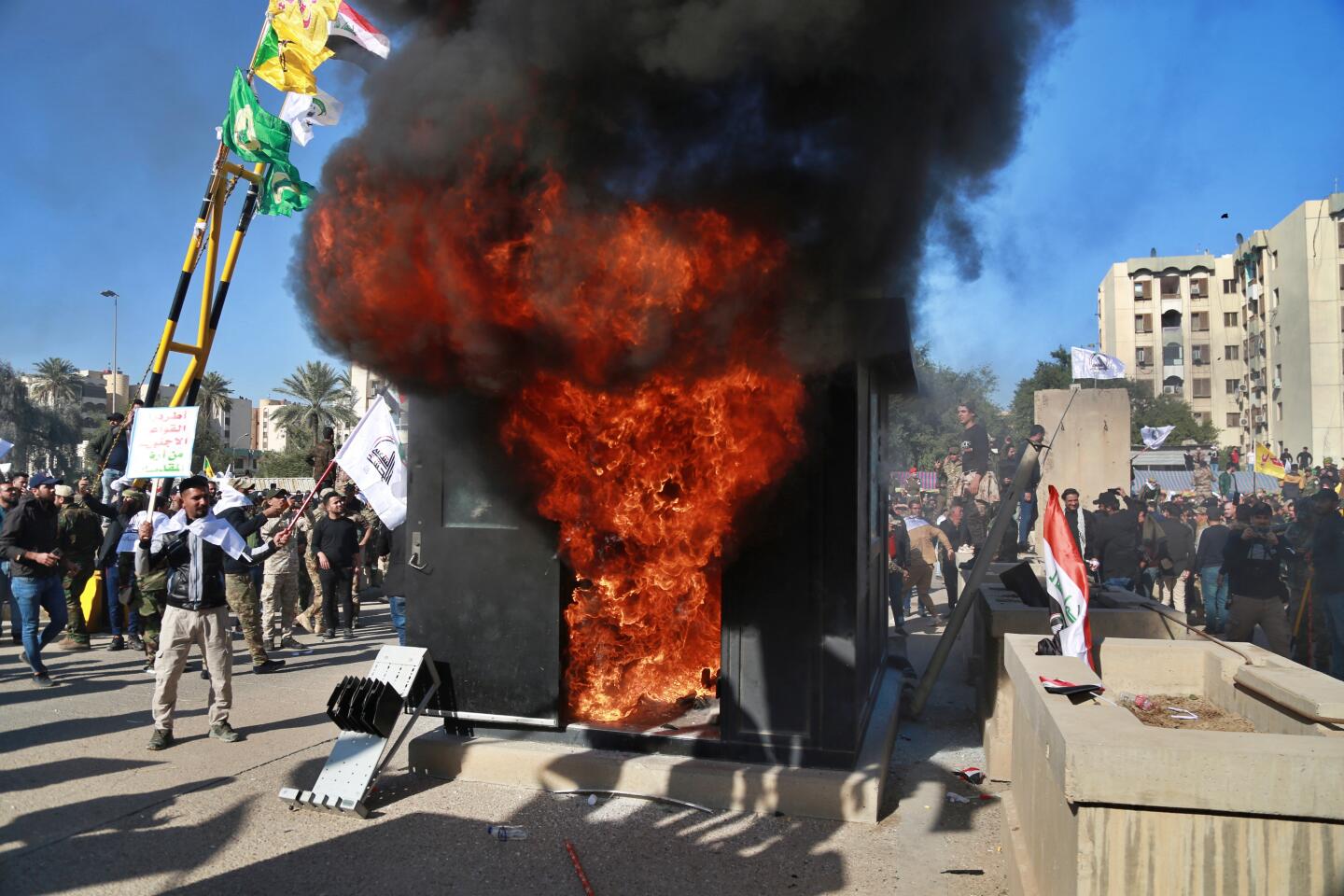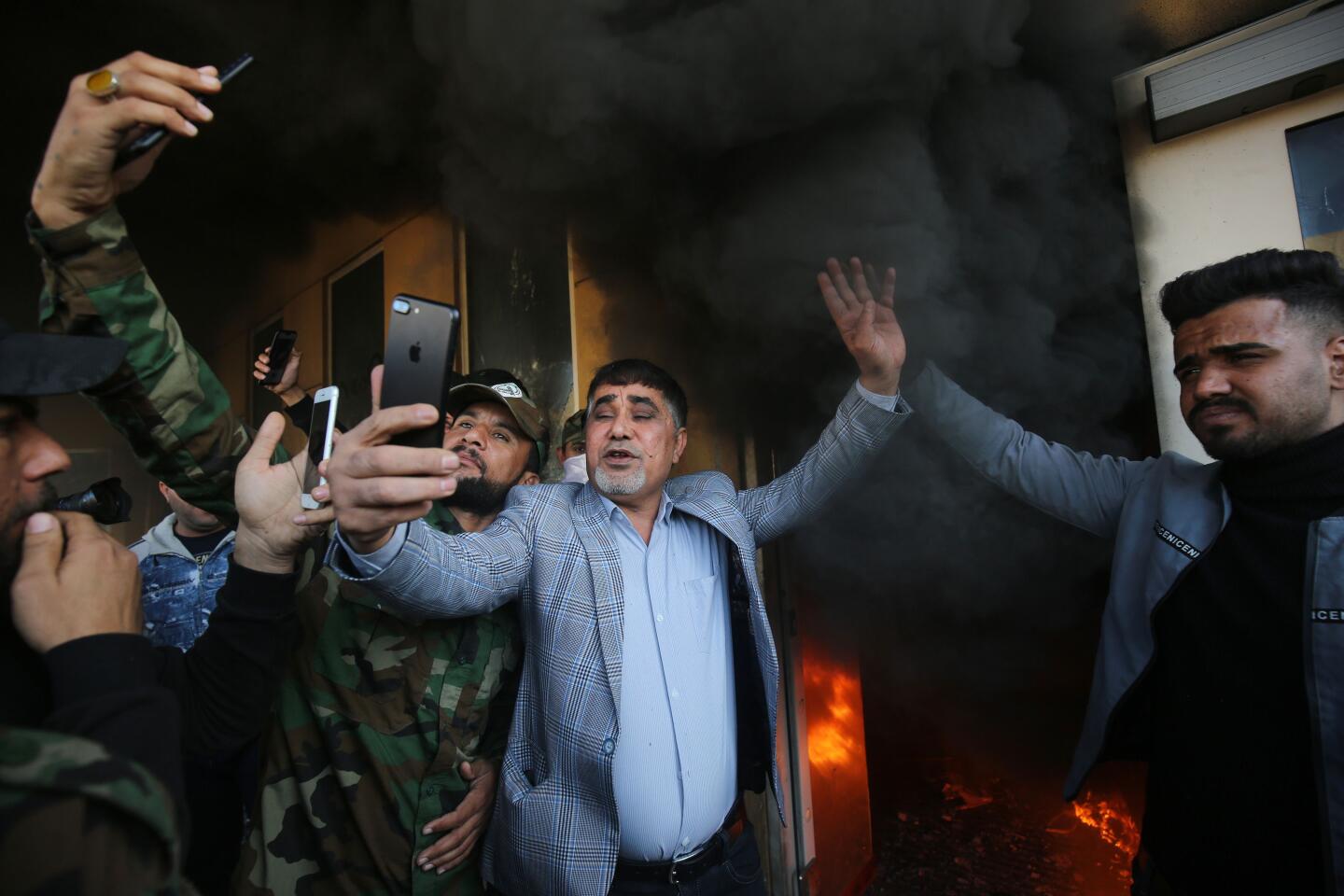Iran launched a series of missile attacks aimed at bases in Iraq. Iranian state television said the missiles were launched as the opening of Tehran’s “revenge” for the U.S. killing of a top Iranian general.
U.S. announces new sanctions on Iran after missile strikes
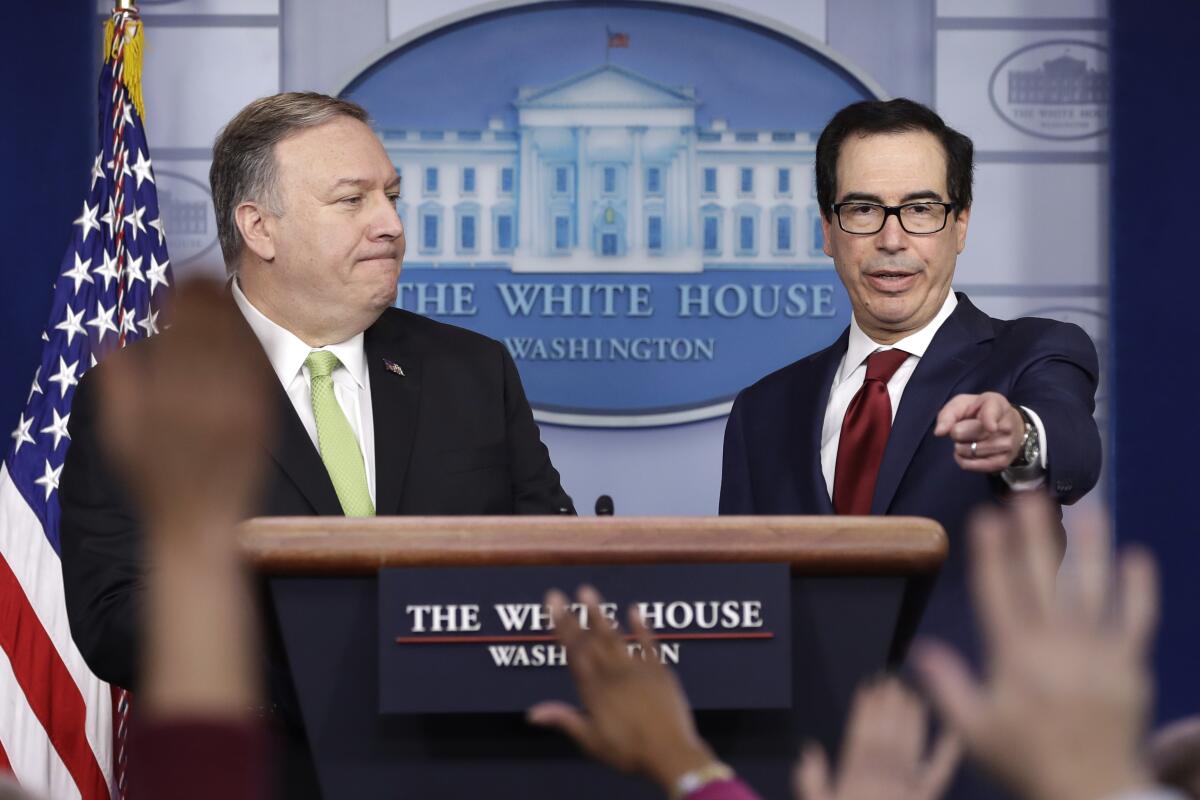
The Trump administration imposed new sanctions on Iran on Friday, a modest turn of the economic screws on a country already facing hundreds of U.S. sanctions that have devastated the economy but had no measurable impact on government policies.
The sanctions targeted Iran’s construction, manufacturing, mining industries, the country’s largest steel and iron manufacturers and eight senior officials.
The announcement marks the Trump administration’s first concrete response following Tuesday night’s retaliatory missile strike by Iran against U.S. forces on two military bases in Iraq just days after the president authorized an attack that killed Maj. Gen. Qassem Suleimani last week — and it underlined the limited array of options aside from an escalation of military force.
Trump boasts Iranian general’s death was ‘American justice’
President Trump used his first campaign election rally of 2020 to argue that he served up “American justice” by ordering a drone strike to take out Iranian Gen. Qassem Suleimani, while jeering Democratic leaders for questioning his decision to carry out the attack without first consulting Congress.
Trump’s remarks yesterday careened from mockery of House Speaker Nancy Pelosi and Rep. Adam B. Schiff, who heads the House Intelligence Committee, to a suggestion that he should have won the Nobel Peace Prize, a preview of the sharp-edged reelection campaign that he will wage.
The president made his comments shortly after the Democratic-controlled House approved a resolution asserting that Trump must seek approval from Congress before engaging in further military action against Iran.
Canada mourns its dead from Ukraine International Airlines Flight 752
Less than 24 hours after Ukraine International Airlines Flight 752 crashed shortly after takeoff in Iran, another passenger jet, Ukraine International Airlines Flight 241, arrived at Pearson International Airport in Toronto.
It had 138 empty seats.
They belonged to the dead.
The majority of the 176 people who perished in the Iran crash Wednesday had been planning to change planes in Kyiv on their way to Canada. They included at least five dozen Canadian citizens.
Among the victims were Siavash Ghafouri-Azar and Sara Mamani, two engineers who had just gotten married in Iran and were on their way home to Canada.
Two newlywed Iranian Canadian couples among those killed in crash
They met as graduate students in Montreal, drawn there by Concordia University’s well-regarded engineering program. They had both landed good jobs in the industry. They recently bought a house in Montreal. They had flown home to Iran for their wedding, attended by family.
“They were going to invite us for a housewarming party this new year,” said their friend, Ali Dolatabadi. “He was very excited.”
The couple, Siavash Ghafouri-Azar and Sara Mamani, was one of at least two pairs of newlyweds on board a Ukraine International Airlines jetliner when it went down shortly after takeoff from Tehran’s international airport early Wednesday, killing all 167 passengers and nine crew members.
Iraqi prime minister tells U.S. to come up with plan for troop withdrawal
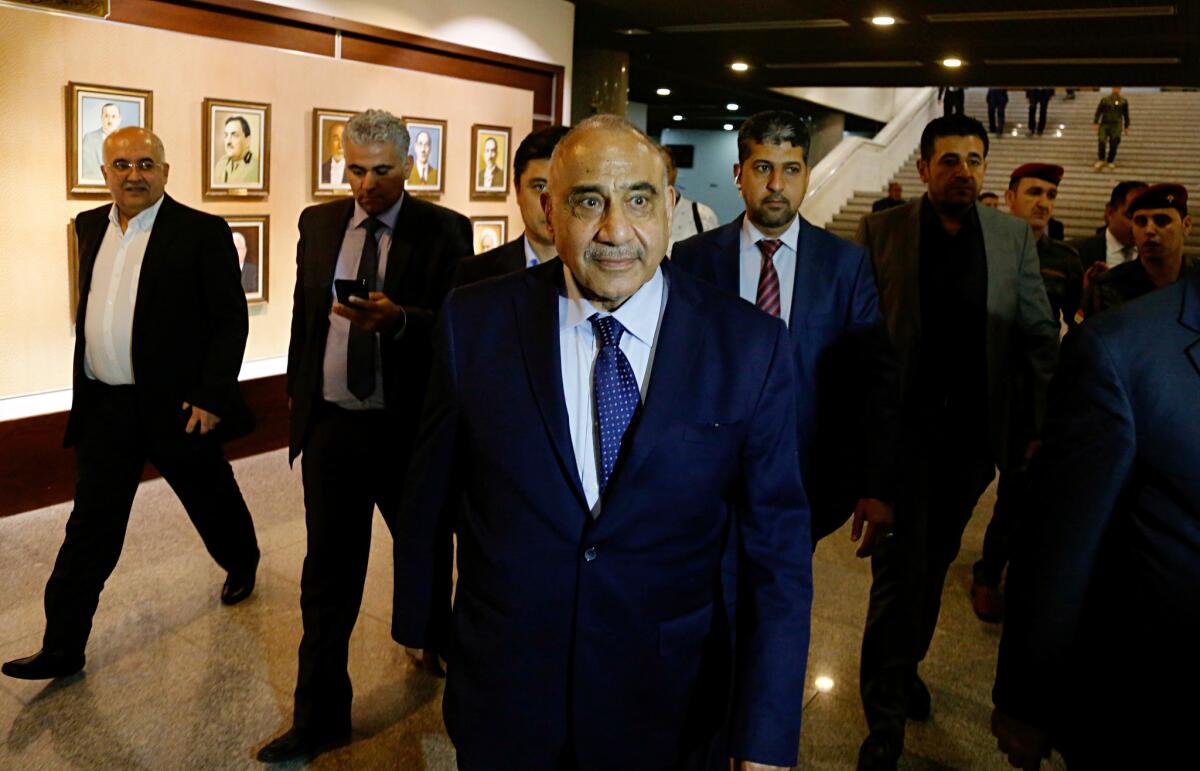
Iraq’s caretaker prime minister asked the U.S. Secretary of State to start working out a road map for an American troop withdrawal from Iraq, his office said Friday, signaling his insistence on ending the U.S. military presence despite recent moves to de-escalate tensions between Iran and the U.S.
Adel Abdul-Mahdi made the request in a telephone call with Secretary of State Michael R. Pompeo on Thursday night, his office said in a statement. He also told Pompeo that recent U.S. strikes in Iraq were an unacceptable breach of Iraqi sovereignty and a violation of the two countries’ security agreements.
Did Iran deliberately avoid U.S. casualties?
WASHINGTON —The commercial satellite images show the damage Iranian missiles left on the remote Iraqi air base — charred rubble where hangars or other facilities once stood and a gaping crater alongside a runway, while nearby buildings stood unscathed.
Less clear is what the high-resolution images reveal about Iran’s intent in targeting the Asad Air Base, which houses U.S. troops, or the precise capabilities of Tehran’s vast missile arsenal.
Tehran may have carried out a limited strike that specifically targeted hangars, not barracks or other buildings more likely to contain U.S. or coalition troops in the predawn hours Wednesday. No casualties were reported after the attack.
Trump’s White House address targets two audiences
WASHINGTON —President Trump made clear as he strutted to the lectern Wednesday, bathed in blinding light as generals and senior advisors cleared a path, that his address on Iran had two aims: to project victory to a domestic audience and to deter a foreign foe.
The long-term impact of Trump’s decision to order the killing of Iranian Gen. Qassem Suleimani remains to be seen, and the president’s broader strategy appears muddy to many national security experts and members of Congress. Yet Iran’s retaliation the night before, by ending without American loss of life, gave both sides an opportunity to deescalate.
And by avoiding a war he nearly started, Trump can claim a success that fits neatly with his political identity, as long as the fragile calm holds.
House to vote on war powers resolution after Trump officials brief Congress on killing of Suleimani
WASHINGTON —The House will vote on a war powers resolution Thursday to limit what military action President Trump can take against Iran after Democrats — and even a couple of Republicans — complained a Trump administration briefing on the justification for killing a top Iranian general came down to simply: Trust us.
Democrats said Defense Secretary Mark Esper, Secretary of State Michael R. Pompeo, CIA Director Gina Haspel and Chairman of the Joint Chiefs of Staff Mark Milley provided few specific details in a closed door meeting Wednesday about what imminent threat existed that warranted the U.S. drone strike that killed Maj. Gen. Qassem Suleimani.
Though there was some initial hesitancy among Democrats earlier in the day about moving to limit the president’s power in the aftermath of Iran’s missile strikes against U.S. forces in Iraq, by the end of the day House members said they were more determined that Congress needs to reassert its role in deciding when military force is necessary.
The general is dead. The missiles have flown. What next?
When faced with foreign threats, the Islamic Republic has long been calculating and strategic. But before Tuesday night, the Islamic Republic’s de facto move had been to operate with a degree of plausible deniability, choosing militant proxies in places such as Iraq to disrupt U.S. interests while advancing its flair for regional mischief.
Its decision to launch 15 ballistic missiles at two military bases used by U.S. forces in Iraq, however, signaled a shift in strategy — if only temporary — to confront the U.S. directly.As swift retaliation for the U.S. killing of Gen. Qassem Suleimani, the missile strikes were designed to appease an angry Iranian population. But the gambit was calibrated so as not to further draw the ire of President Trump, who along with Iranian leaders appeared to ease tensions on Wednesday.
Both sides claimed victory. Yet the larger, more menacing dilemma is what Iran’s next maneuver will be in its decades-long struggle with America. Tehran is skilled at asymmetrical warfare, cyberattacks and bold strikes, such as last year’s drone assault on a Saudi Arabian oil refinery that rattled world markets. Iran also has third-party forces, most notably the Lebanon-based militant group Hezbollah, that can be called on to create conflicts across the Middle East, including in Israel, Iraq, Syria and Sunni Arab gulf states.
Stocks jump and oil prices fall as U.S.-Iran conflict eases
Markets unclenched Wednesday, and U.S. stocks neared record highs on hopes that the United States and Iran were backing away from the edge of war.
The rally capped a whirlwind day of reversals that swept through markets around the world. Stocks initially reeled after Iran fired missiles at two bases in Iraq housing U.S. troops — retaliation for a U.S. drone strike that killed a top Iranian general last week.
Gold prices soared overnight as investors scrambled for safety; crude prices jumped on fears a war would squeeze oil supplies; and the futures market suggested U.S. stocks would drop sharply as soon as trading opened in New York. But the selling abated as reports suggested no Americans died and after Iran’s foreign minister said his country had concluded “proportionate measures in self-defense.”
Camp Pendleton and other military bases increase security amid Iran conflict
Amid escalating tensions between the United States and Iran, the U.S. Northern Command — the agency that oversees the Department of Defense’s homeland defenses — has directed Camp Pendleton and other California military bases to increase security conditions.
After a U.S. drone strike targeted and killed Iran’s top military leader, Gen. Qassem Suleimani, Camp Pendleton posted a notice to its social media channels Jan. 4 that the Marine Corps base in San Diego County, one of the largest in the country, will begin a 100% ID check policy.
The base warned travelers to expect delays at entry points as all vehicle occupants will be required to present an ID upon entering Camp Pendleton, said Capt. David Mancilla, a base spokesman.
Map of where the Iranian missiles landed
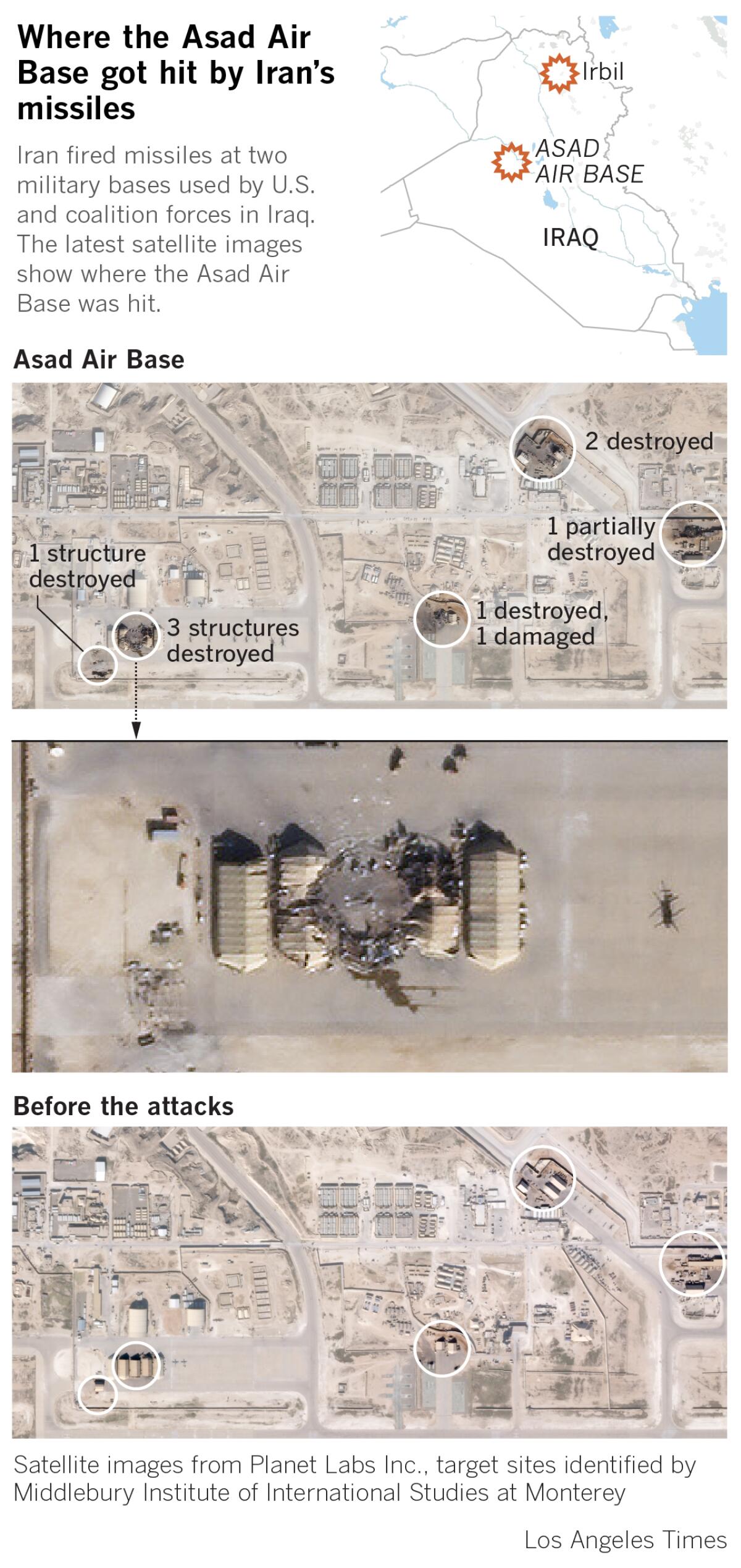
Read President Trump’s full remarks on the Iranian missile attacks
President Trump responded Wednesday morning following Iran’s overnight missile attacks at U.S. forces posted at bases in Iraq, announcing he would impose additional economic sanctions on Tehran but making no commitment to the punishing military response he had threatened only days ago. Here are his full remarks.
Trump says Iran appears to be ‘standing down’ after strike
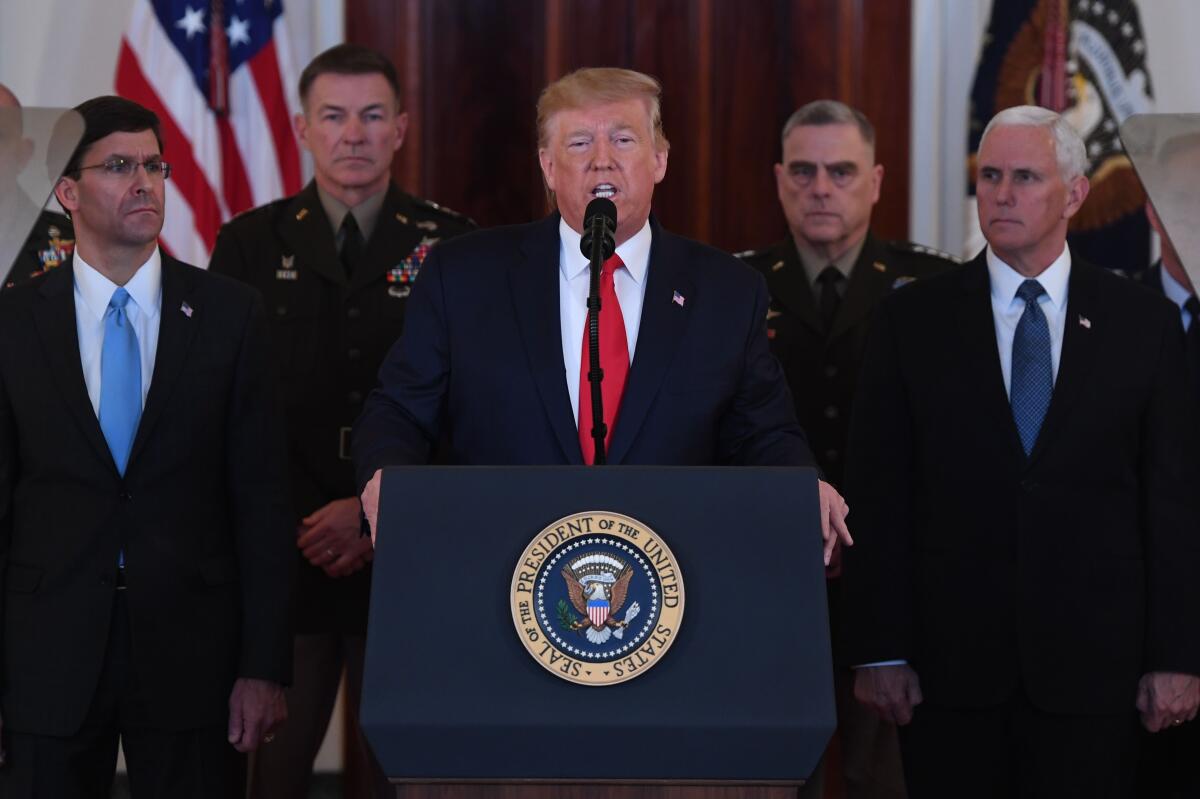
President Trump responded Wednesday morning following Iran’s overnight missile attacks at U.S. forces posted at bases in Iraq, announcing he would impose additional economic sanctions on Tehran but making no commitment to the punishing military response he threatened only days ago.
“Our great American forces are prepared for anything,” he said in an address from the White House. “Iran appears to be standing down, which is a good thing for all parties concerned and a good thing for the world,” Trump said. He noted that no Americans or Iraqis were killed in the attack “because of the precautions taken, the dispersal of forces, and an early warning system that worked very well.”
U.S. officials have not reported any casualties from the 15 ballistic missiles fired from Iran, and there were indications that the two sides could back away from the brink without further escalation.
Over the past five days, Trump repeatedly threatened to unleash a devastating attack on Iran if they conducted any military response to the U.S. drone strike that targeted and killed Maj. Gen. Qassem Suleimani, a top Iranian commander. His death infuriated Iran’s leaders.
But Trump now appears reluctant to follow through on that rhetoric. That may be because there is some speculation that Iran’s missiles appear to have been calibrated to avoid killing U.S. forces.
Initial photo analysis indicates Iran was targeting airbase hangars
Watch live: Trump gives speech after Iran attack on U.S. bases in Iraq

Trump addresses nation on Iran airstrikes
For Iraqis, an unwanted conflict threatens their country once more
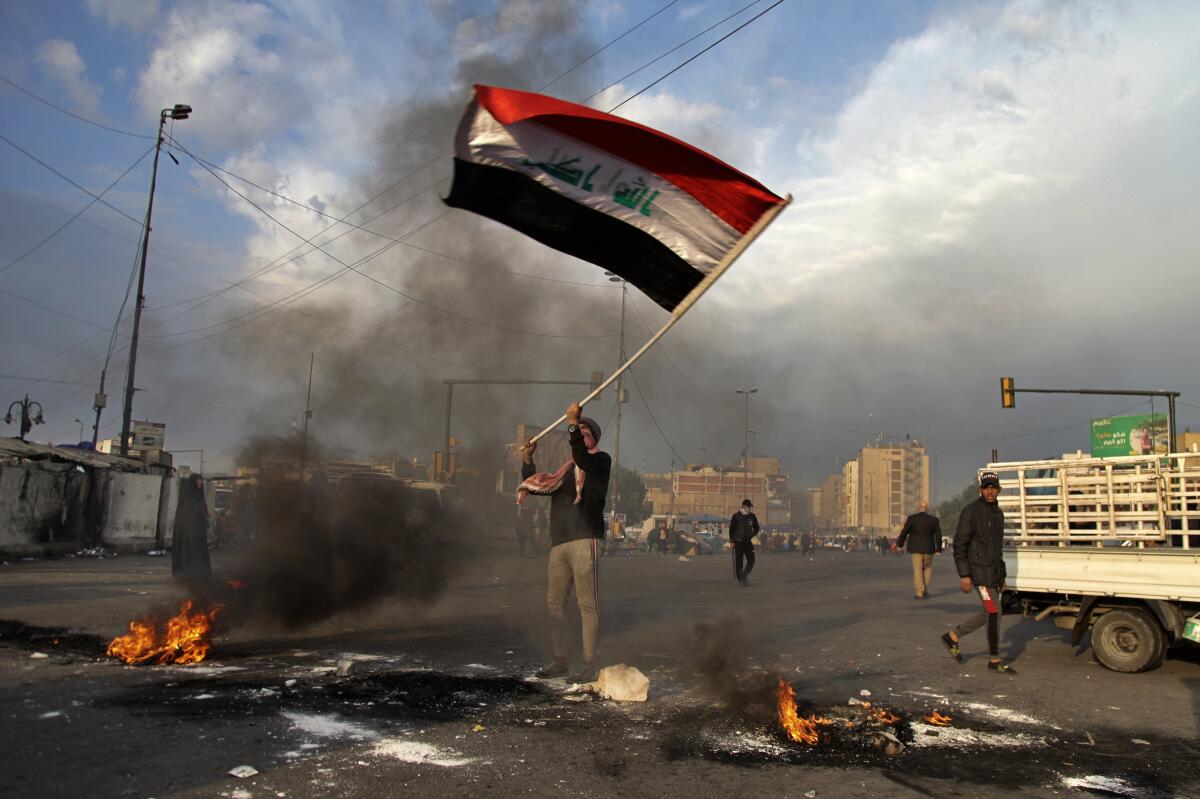
There’s a common joke Iraqis repeat as of late. It goes something like this: “Iran is fighting to get the U.S. out of Iraq. The U.S. is fighting to get Iran out of Iraq. How about we Iraqis get out of our country and leave you to it?”
It’s an example of the fatalistic humor people have used here in recent days as the U.S. and Iran’s saber-rattling gave way to attacks presumably on each other but which mostly put Iraqis in harm’s way. Yet behind the jokes is the very serious fear of an all-out war breaking out between Washington and Tehran, with Iraq as its chessboard, and Iraqis — yet again — its pawns, if not its casualties.
For anyone visiting Baghdad, which was dubbed the “City of Peace” by its founders but which has seen little of it since the U.S. invasion in 2003 and even before, signs of that fear are inescapable.
Republican lawmakers praise Trump’s approach ahead of address
Ahead of Trump’s speech, House Republicans held a news conference praising the president’s approach to Iran and urging Democrats to unite behind him.
Rep. Dan Crenshaw (R-Texas) maintained that the president was not risking war.
“The president is not taking us to all-out war. There is a lot in between. We have to be more honest about that fact.”
While defending Trump’s decision to kill top Iranian Gen. Qassem Suleimani, House Republicans appeared to be giving him room to deescalate.
House Minority Leader Kevin McCarthy (R-Bakersfield) noted that no Americans were killed at the bases in Iraq on Tuesday, in contrast to the attack last month that killed a U.S. contractor and resulted in U.S. retaliation.
“The president made it very clear: If you kill an American, we will respond directly, and we did. We are safer for it.”
Senate Majority Leader Mitch McConnell (R-Ky.) also gave Trump space in remarks on the Senate floor Wednesday morning.
“I’m grateful for his patience and prudence as he and his Cabinet deliberate how to respond appropriately to the latest Iranian provocation,” McConnell said. “As a superpower, we have the capacity to exercise restraint and to respond at a time and place of our choosing, if need be.”
He added: “I hope Iran’s leaders do not miscalculate by questioning our collective will in launching further attacks.”
Trump’s restraint so far following Iran’s strikes comes in stark contrast to his repeated warnings to Tehran in recent days.
“They attacked us, & we hit back. If they attack again, which I would strongly advise them not to do, we will hit them harder than they have ever been hit before!” he tweeted on Jan. 4.
In another tweet on the same day, Trump said that if Iran strikes “any Americans, or American assets” that he would strike back “VERY FAST AND VERY HARD.”
Office of Iraqi president condemns Iran missile strikes
The office of Iraq’s president has condemned Iranian missile strikes on two Iraqi military bases hosting U.S. troops, reiterating its rejection of breaches of Iraq’s sovereignty.
President Barham Salih’s office also said in a statement that the fate of U.S. troops in Iraq was an internal matter based on legal agreements to combat the Islamic State group.
The statement adds that Iraq “has previously declared its refusal to be a starting point for aggression against any country, and also refuses to be a source of threat to any of its neighbors.”
The Iraqi prime minister publicly said U.S. troops must leave after a drone strike killed Iran’s top military commander in Baghdad, and parliament has passed a non-binding resolution pushing for withdrawal.
Trump refrains from quick counterattack on Iran
President Trump will address the nation this morning about Iran’s overnight missile attacks at U.S. forces posted at bases in Iraq, as the world waits for a response from an unpredictable commander-in-chief that should indicate whether the sudden conflict will spiral further toward war.
U.S. officials have not confirmed any casualties from the 15 ballistic missiles fired from Iran, and there were some indications that the two sides could back away from the brink without further escalation.
Over the last five days, Trump repeatedly threatened to unleash a devastating attack on Iran if it conducted any military response to the U.S. drone strike that targeted and killed Maj. Gen. Qassem Suleimani, a top Iranian commander. His death infuriated Iran’s leaders.
President Trump to address nation Wednesday morning
President Trump is set to address the nation in the White House’s Entrance Hall at 11 a.m. Eastern on the Iranian crisis. Vice President Mike Pence also is expected to attend.
Commercial airlines reroute flights amid Mideast tensions
Commercial airlines on Wednesday rerouted flights crossing the Middle East to avoid possible danger amid escalating tensions between the United States and Iran.
The flight restrictions reflected fears that the conflict between the longtime foes could ratchet up following Iranian ballistic missile strikes Tuesday on two Iraqi bases that house U.S. troops. Those strikes were retaliation for the U.S. killing of Iranian Revolutionary Guard Gen. Qassem Suleimani in a drone strike near Baghdad last week.
The U.S. Federal Aviation Administration said it was barring American pilots and carriers from flying in areas of Iraqi, Iranian and some Persian Gulf airspace. The agency warned of the “potential for miscalculation or mis-identification” for civilian aircraft amid heightened tensions between the U.S. and Iran.
Such restrictions are often precautionary in nature to prevent civilian aircraft from being confused for ones engaged in armed conflict. The FAA said the restrictions were being issued due to “heightened military activities and increased political tensions in the Middle East, which present an inadvertent risk to U.S. civil aviation operations.”
Iran supreme leader says missiles are a ‘slap’ compared to Suleimani’s killing
Hours after launching missiles at two U.S. military bases in Iraq, Iranian Supreme Leader Ayatollah Ali Khamenei in a televised address made clear the attack was done to avenge the death of Qassem Suleimani, a top general who was killed in a Trump-ordered airstrike last week.
Last night they received a slap. These military actions are not sufficient (for revenge). What is important is that the corrupt presence of America in this region comes to an end.
— Khamenei said in a speech after the missile strikes
Despite the heightened rhetoric, there were some indications that there would not be more immediate retaliation on either side.
Iran’s foreign minister, Javad Zarif, on Twitter Tuesday night suggested the strike could be the beginning and end of Iran’s retaliation.
“We do not seek escalation or war,” he wrote, “but will defend ourselves against any aggression.”
Slovenia will evacuate soldiers based in Iraq
Slovenia’s defense ministry says its six soldiers stationed in northern Iraq with a German-led training mission will be evacuated after their base came under attack in Iran’s retaliatory missile strike for the U.S. killing of Iran’s top general.
The Slovenian ministry said Wednesday the soldiers were unhurt in the attack near Irbil as they were in the base’s shelter during the strike.
The ministry said the evacuation would be conducted “in cooperation with the German partners.” It did not say where the soldiers would go.
U.S. contractor killed in Iraq is buried in Sacramento
A U.S. defense contractor killed in Iraq in December — during a rocket attack that led to heightened tensions with Iran and the killing of a prominent Iranian military leader — was buried Saturday in Sacramento, the Sacramento Bee reported.
Nawres Waleed Hamid died Dec. 27 in the rocket strike on an Iraqi military base where he worked as a linguist, according to the Bee and wire service reports.
The United States blamed Kataib Hezbollah (the Hezbollah Brigades), a top paramilitary faction that is backed by Iran, for the attack that killed Hamid and responded by striking multiple positions of the group, killing some 25 people and wounding 51 others. Two days after that airstrike, thousands of protesters aligned with an Iraqi paramilitary group stormed the compound of the U.S. Embassy in Baghdad on Dec. 31. Gen. Qassem Suleimani, the powerful and shadowy head of Iran’s elite Quds Force, was killed Friday.
Iranian Foreign Minister Javad Zarif signals missile strike could be end of retaliation
Iran’s foreign minister, Javad Zarif, sent a message on Twitter that suggested the missile strike could be the beginning and end of Iran’s retaliation.
“Iran took & concluded proportionate measures in self-defense under Article 51 of UN Charter targeting [the] base from which cowardly armed attack against our citizens & senior officials were launched,” he said, referring to the Asad Air Base, which is a major base for U.S. drone attacks.
“We do not seek escalation or war, but will defend ourselves against any aggression,” he wrote.
Whether Zarif speaks for all factions of Iran’s government is not clear. He has frequently been denounced by figures allied with the Revolutionary Guards.
Trump tweets ‘all is well’ and says he will make a statement Wednesday
(Required)
Democratic presidential candidates offer support for U.S. troops
Democratic presidential candidates offered support for U.S. troops Tuesday after Iran launched a missile attack on military bases in Iraq. The Democrats also urged President Trump and Iranian leaders to ease tensions between the two nations.
At an event Tuesday night in Brooklyn, N.Y., former Housing and Urban Development Secretary Julián Castro appeared with Massachusetts Sen. Elizabeth Warren after he ended his bid for president and endorsed her. Castro began by addressing the news of the strike.
“Tonight, we’re thinking about our men and women in uniform, especially those who are stationed in Iraq,” he said, “and we pray for their safety.”
Warren, who came onstage soon after, said it was important to start on a “sober note.”
“Within the last hour, the Iranian government has announced that it has sent missiles to attack our military bases in Iran,” she said, noting that her three brothers also served in the military.
“But this is a reminder of why we need to de-escalate tension in the Middle East,” she said. “The American people do not want a wart with Iran.”
She offered, like many of the other candidates, prayers to those stationed overseas.
Former Vice President Joe Biden told supporters at a fundraiser in Philadelphia that the events on Tuesday in Iran and Iraq were predictable.
“Not exactly what’s happening but the chaos that’s ensuing,” he explained before sharply criticizing Trump for withdrawing from the Iran nuclear deal and the recent order of a missile strike that killed high-ranking Iranian Gen. Qassem Suleimani.
“Some of the things [Trump’s] done and said in the meantime have been close to ludicrous,” Biden said. “Including threatening to bomb holy sites.… And I just pray to God as he goes through what’s happening, as we speak, that he’s listening to his military commanders for the first time because so far that has not been the case.”
Other candidates offered messages on Twitter.
“Praying for the safety of our troops and personnel in Iraq right now,” said New Jersey Sen. Cory Booker.
Former South Bend, Ind., Mayor Pete Buttigieg wrote: “Tonight, Americans in Iraq are under fire. My prayers are with them, their loved ones, and their families.”
Minnesota Sen. Amy Klobuchar said she was closely monitoring the situation in Iraq. “We must do all we can to protect our service members and Americans at risk,” she said.
Iran launched 15 missiles. 11 hit targets, according to a U.S. defense official
Iran launched 15 missiles, of which 11 hit their targets and four failed in flight, according to a U.S. defense official, who said there were no reports of U.S. casualties in the attack.
Ten of the missiles hit the sprawling Asad Air Base in Iraq’s western Anbar province. U.S. radar was able to track the missiles in flight and, as a result, personnel at the base were able to take cover. The U.S. made no effort to intercept the missiles, the official said.
One missile hit the Combined Joint Operations Center in Irbil, where the U.S. trains Iraqi Kurdish fighters and also runs a large air operations control center covering northern Iraq and parts of Syria.
The official, who was not authorized to speak on the record, said the U.S. Central Command was aware of reports of Iraqi casualties in Irbil but that those remained unconfirmed.
Expert on Iranian arsenal thinks Tehran used short-range ballistic missiles in attack
Fabian Hinz, an expert on Iran at the Middlebury Institute of International Studies at Monterey, said it appears that Tehran used short-range ballistic missiles in the attack.
Iran’s technology has advanced rapidly in recent years. If the missiles work properly, they are accurate within 10 or 15 meters, down from hundreds of meters two decades ago, Hinz said.
It’s hard to say at this point how much damage the Iranians were trying to inflict on the bases.
“The Iranians are very proud of being able to target specific buildings,” Hinz said. “They would have satellite pictures, they would have targeting information.”
However, Hinz said firing missiles as a mere show of force would be dangerous given the possibility of a missile veering off course even if it’s targeted at an empty part of the base. “You could do that, but it would be incredibly risky.”
President Trump will not address the nation tonight
(Required)
National Iranian American Council issues statement on missile strike
In response to reports that Iran had launched missiles targeting U.S. military bases in Iraq, the National Iranian American Council, or NIAC, issued the following statement:
“NIAC is deeply concerned by reports of Iranian missile attacks against U.S. military bases inside Iraq. We condemn all military escalations by both the Iranian and U.S. governments that have led us to this tragic and avoidable point. It is not too late to pull back from a full-blown war.
“However, that window is closing rapidly. Congress must act immediately to halt hostilities and prevent Trump’s threats of massive retaliation, including bombing of Iranian cultural sites. Donald Trump owns this 100%. He inherited a working nuclear deal and a tense but stable situation with Iran.
“He has deeply wounded the first major diplomatic initiative between the U.S. and Iranian government in decades, and listened to ideologues who convinced him to assassinate an Iranian general. At every step of the way, he has been warned he risked moving back on the path to war. Now that day may be here.
“Our thoughts are with all the people who will be harmed by this senseless and needless conflict. It is ordinary Iranians, Iraqis, and people across the region who will bear a profound cost that can’t be justified. So too will American soldiers, and their families here at home, who will bear the consequences of yet another war that was thrust upon them by callous leaders.
“We call on the international community and the United Nations to do everything in its power to find a diplomatic resolution to these hostilities before the entire region erupts in war.
“We also remain deeply concerned about the Trump administration’s detainment of Iranian Americans at the border on the basis of national heritage and additional discriminatory actions against our community. We will remain vigilant amid the looming specter of war and safeguard our community’s rights.”
Iranian official tweets image of flag mimicking Trump tweet after Suleimani strike
Iranian state television warns U.S. against retaliation
Iranian state television warned the U.S. against a tit-for-tat response, quoting officials of the Revolutionary Guards — the force that Gen. Qassem Suleimani headed — as having “warned America that if they respond to the Iranian missile attack, the Iranian response will be much harsher, wider and stronger.”
The Iranian attack was launched at 1:20 a.m. local time, Iranian officials said, noting it was the precise time of the U.S. missile strike that killed Suleimani as he left Baghdad’s airport.
At least some analysts said if the Iranian attack did not go further, it might not generate a response from the U.S.
“If there are no U.S. casualties, and this is the extent of Iranian retaliation, then the U.S. does not need to escalate,” said Faysal Itani, deputy director of the Center for Global Policy, a Washington think tank that specializes in Muslim politics.
“Iran can fire the missiles. Killing Suleimani was a far bigger blow.”
Reactions from Congress on missiles launched at U.S. forces in Iraq
Rep. Tom Malinowski (D-N.J.), who was an assistant secretary of State during the Obama administration, called the missile attack “awful” but “predictable.”
“Its not excusable but its predictable,” he said. “Leaders must take responsibility for the predictable consequences of their actions — even if their actions are evil, despicable.”
A key concern Malinowski wants the administration to address in Wednesday’s Capitol Hill briefing is how the U.S. plans to avoid being removed from Iraq or being rendered ineffective in its work with Iraqi security forces.
“How are you going to avoid that?” he asked. “Because if you don’t, then you will be giving [Qassem] Suleimani in his death what he failed to achieve in his life.”
“The good news is that we have two countries that both have an interest in avoiding war and there are ways to do that in circumstances like this — if there is disciplined responsible leadership on both sides.”
Sen. Rand Paul (R-Ky.), a frequent critic of U.S. military intervention, voiced concerns that the violence would grow.
“I am praying for the safety of our troops in Iraq tonight,” he tweeted. “While I would have preferred they come home long ago, there is also no excuse for this action by Iran. We need to stop the escalation before it leads to another endless war in the Middle East.”
Footage from Iranian TV shows images of missiles being fired into Iraq
About an hour after airing video that it said showed missile launches aimed at bases housing U.S. forces in Iraq, Iranian state television showed what it described as a second wave of missiles.
Social media posts from Iran reporting the attacks bore the hashtag “harsh retaliation.”
Pelosi received notification of attack during meeting of House Democratic leaders
House Speaker Nancy Pelosi (D-San Francisco) was notified of the attack in a note handed to her during a meeting of House Democratic leaders, according to Democrats in the room.
“She told us it had happened and [added:] ‘We’re all praying,’” said Rep. Debbie Dingell (D-Mich.), who was in the meeting.
The attack comes as Trump administration officials were scheduled to brief members of Congress on Wednesday about last week’s killing of Gen. Qassem Suleimani.
Pelosi and other congressional leaders were briefed Tuesday evening.
“It’s sad,” said Rep. Hakeem Jeffries (D-N.Y.). “We’re hopeful that no American lives will be lost.”
U.S. official confirms ‘more than a dozen ballistic missiles’ have been fired against U.S. military in Iraq
Iran has launched “more than a dozen ballistic missiles” that targeted at least two bases housing U.S. troops, the Pentagon confirmed Tuesday.
The U.S. has not confirmed any casualties from the attack, which Iran said marked the beginning of its “harsh retaliation” for the U.S. killing of one of the country’s leading officials, Gen. Qassem Suleimani.
“It is clear that these missiles were launched from Iran,” Pentagon spokesman Jonathan Hoffman said in a statement. The bases were already on high alert, Hoffman said, as U.S. forces prepared for Iran to retaliate for Suleimani’s death.
The missiles were aimed at the large Asad Air Base in western Iraq as well as at Irbil, in the Kurdish-governed region of the country, the Pentagon said.
The complete statement from Hoffman:
“At approximately 5:30 p.m. (EST) on January 7, Iran launched more than a dozen ballistic missiles against U.S. military and coalition forces in Iraq.
“It is clear that these missiles were launched from Iran and targeted at least two Iraqi military bases hosting U.S. military and coalition personnel at Al-Assad and Irbil. We are working on initial battle damage assessments. In recent days and in response to Iranian threats and actions, the Department of Defense has taken all appropriate measures to safeguard our personnel and partners.
“These bases have been on high alert due to indications that the Iranian regime planned to attack our forces and interests in the region. As we evaluate the situation and our response, we will take all necessary measures to protect and defend U.S. personnel, partners, and allies in the region. Due to the dynamic nature of the situation, we will continue to provide updates as they become available.”
Defense official confirms missiles have been fired from Iran; no casualties reported
“Multiple ballistic missiles fired from Iran” have hit a major U.S. base in western Iraq, a U.S. defense official said Tuesday, confirming Iranian reports.
There are no casualties reported so far at Asad Air Base, the official said. The base, one of the largest U.S. facilities in Iraq, houses both Iraqi and U.S. forces.
At the White House, Press Secretary Stephanie Grisham said officials were “aware of the reports of attacks on U.S. facilities in Iraq.”
“The president has been briefed and is monitoring the situation closely and consulting with his national security team,” she said.
Iranian TV says Tehran has launched missiles at bases in Iraq
Iran launched a series of missile attacks aimed at bases in Iraq, Iranian state television reported Tuesday, saying that the missiles had been launched as the opening of Tehran’s “revenge” for the U.S. killing of last week a top Iranian general.
The Iranian Fars news agency had footage it said showed “tens” of missiles being launched toward Asad Air Base in northwest Iraq, which houses both Iraqi and U.S. forces.
The attack was the “beginning of a harsh Iranian revenge” for the death of Gen. Qassem Suleimani, the Iranians said. The apparent attack marks a major escalation of the conflict between the U.S. and Iran, with Tehran not only directly attacking U.S. positions, but openly acknowledging having done so.
U.S. officials have frequently accused Iran of being behind attacks on U.S. forces in Iraq, but those attacks have generally involved Iranian-backed militias, not Iranian forces, themselves.
Trump retreats from threats to attack Iranian cultural sites
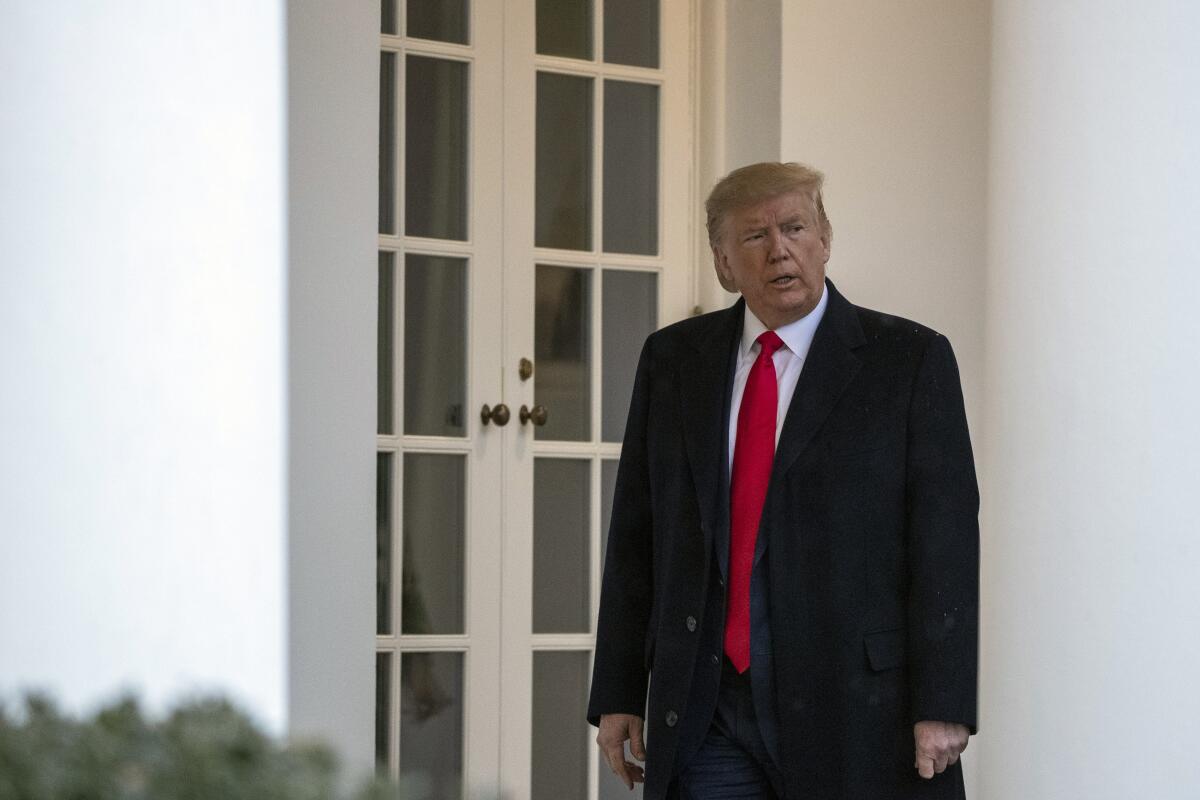
President Trump on Tuesday backed away from his threats to target Iranian cultural sites if Iran were to retaliate against the U.S. for killing one of its top generals.
Targeting cultural sites is a war crime.
After first tweeting the threat and later reiterating it to reporters as he flew back to Washington over the weekend, Trump retreated Tuesday, saying, “I like to obey the law.”
But he still sounded offended by the idea that such sites would be off-limits during armed conflict.
“Think of it,” Trump said during an Oval Office appearance. “They kill our people. They blow up our people. And then we have to be very gentle with their cultural institutions?”
Trump added: “But I’m OK with it. It’s OK with me.” He then issued yet another stern warning to Iran to stand down, saying, “If Iran does anything they shouldn’t be doing, they are going to be suffering the consequences, and very strongly.”
Rand Paul breaks with Trump over airstrike
Kentucky Sen. Rand Paul said President Trump “got bad advice” when authorizing an airstrike that killed Gen. Qassem Suleimani, a revered Iranian figure accused of committing atrocities against Americans. The move, the Republican said, effectively ended any chance of diplomacy with Iran.
Rand said “killing a country’s major foreign general is an act of war” and that Trump should seek permission from Congress before engaging further.
Not doing so goes “against the traditions of our Constitution,” Paul said on CNN’s “The Situation Room.”
What is being proposed by the Trump administration in Iran “is something that will fester and go on and on” and that there will be “intermittent violence” in the Middle East for generations.
Canada relocating some soldiers out of Iraq
Canada’s top general says his country’s military is temporarily relocating some soldiers from Iraq to Kuwait.
Gen. Jonathan Vance made the announcement Tuesday, when news also broke of a stampede at the funeral of Gen. Qassem Suleimani, killing dozens and injuring hundreds in his hometown of Kerman, Iran.
In Iraq, Western troops have been on high alert since the killing of Iran’s top general by a U.S. drone strike last week in Baghdad.
Canada has about 500 soldiers in Iraq to help fight the Islamic State group. Canada currently leads the NATO training mission in Iraq.
GOP congressman tweets fake image of Iranian president and Obama
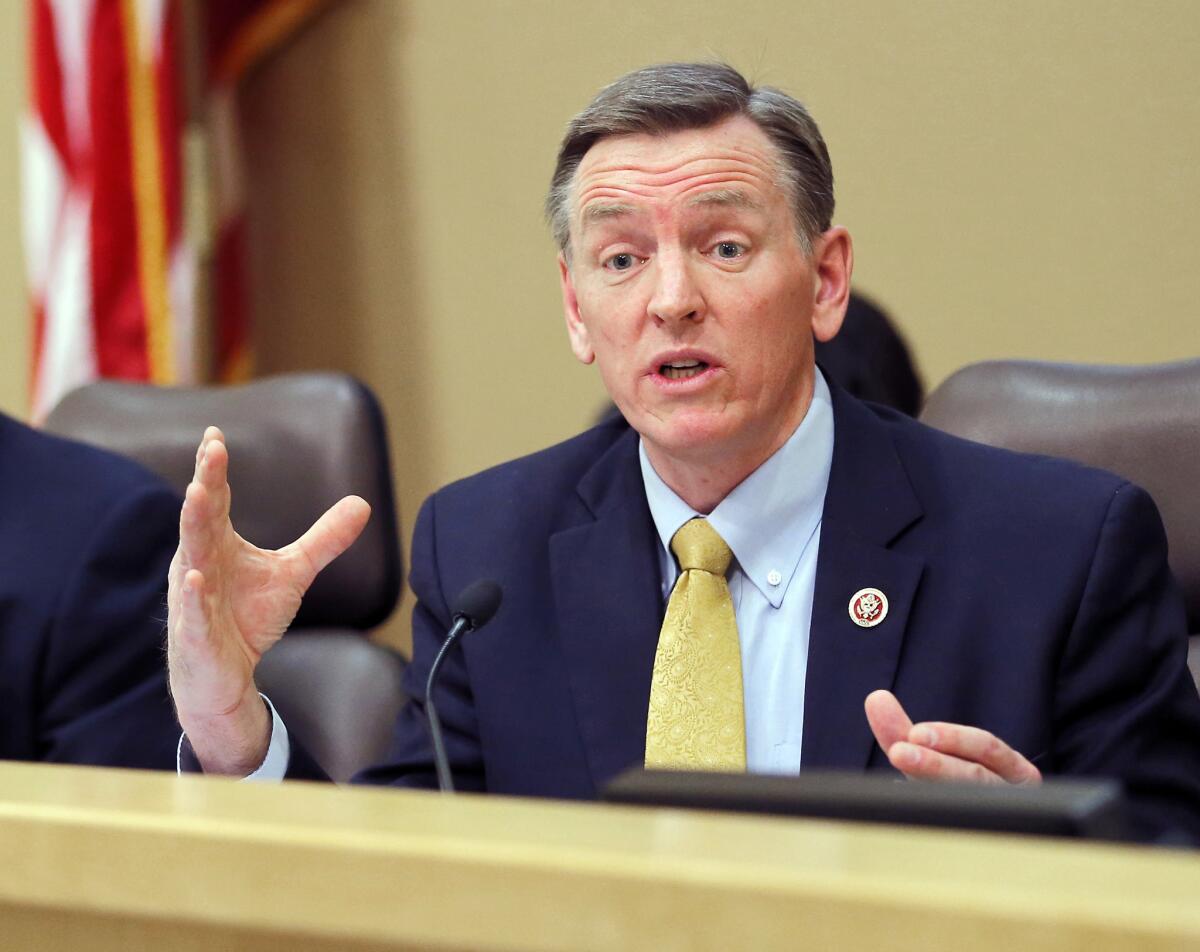
A Republican congressman shared a doctored image of former President Obama shaking hands with Iranian President Hassan Rouhani on Monday, in an apparent nod to President Trump, who last week ordered an airstrike that killed a top Iranian general.
The “world is a better place without these guys in power,” tweeted Paul Gosar, who represents Arizona’s 4th Congressional District.
The image, which was previously deemed fake by fact-checking outlets, received fierce backlash online.
“It’s disgusting that a U.S. representative would disseminate misinformation like this,” tweeted Walter Shaub, former director of the Office of Government Ethics.
In response to widespread criticism, Gosar tweeted that “no one said this wasn’t photoshopped. No one said the president of Iran was dead. No one said Obama met with Rouhani in person.”
But the “point remains to all but the dimmest: Obama coddled, appeased, nurtured and protected the world’s No. 1 sponsor of terror. The world is better without Obama as president. The world will be better off without Rouhani,” he said.
President Rouhani is still in office.
The doctored image is said to be from a 2015 anti-Iran nuclear deal TV ad that ran in the Madison, Milwaukee and Green Bay, Wis., markets. The photo from which the fake image is derived was taken during a 2011 meeting between Obama and then-Indian Prime Minister Manmohan Singh.
Stampede kills dozens, injures more than 200 at funeral for Iranian general killed by U.S.
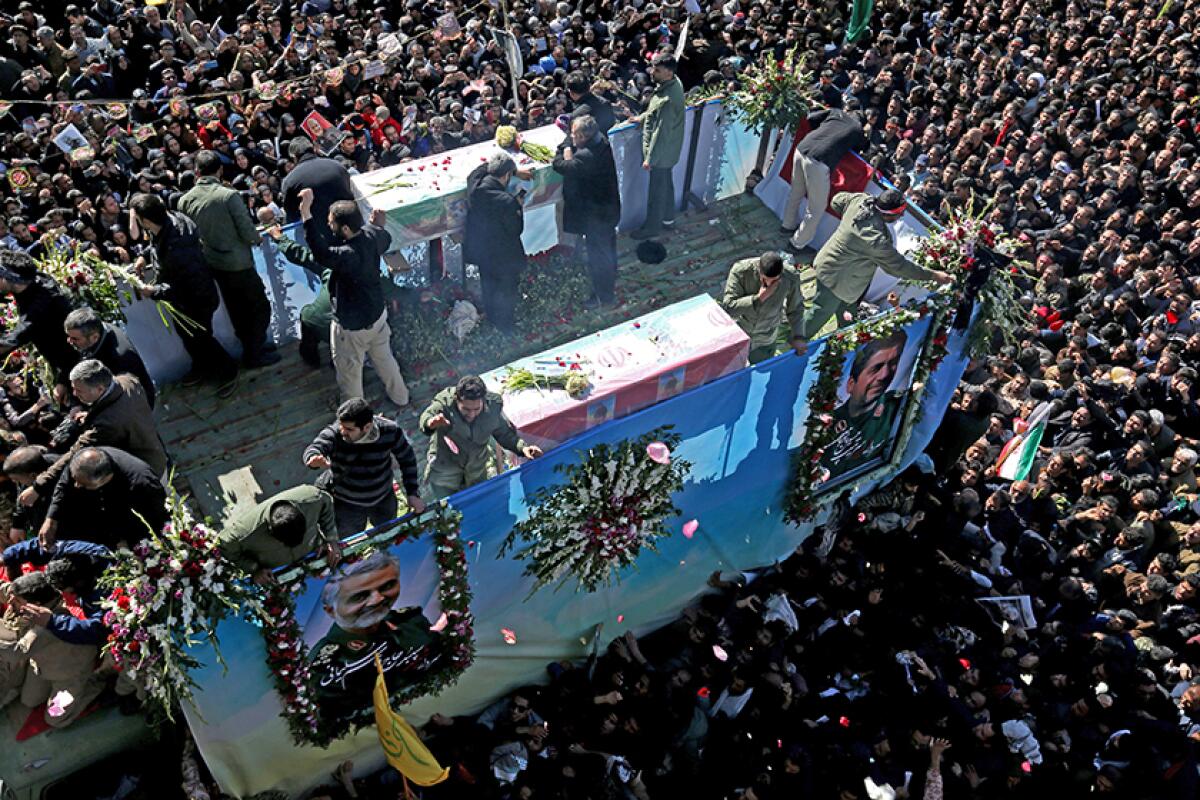
A stampede Tuesday at a funeral procession for a slain top Iranian general killed 40 people and injured 213 others, two Iranian semiofficial news agencies reported.
The stampede took place in Kerman, the hometown of Revolutionary Guard Gen. Qassem Suleimani, as the procession got underway, said the Fars and ISNA news agencies, citing Pirhossein Koulivand, the head of Iran’s emergency medical services.
There was no information as to what had set off the stampede. Initial videos posted online showed people lying lifeless on a road and others shouting and trying to help them. Suleimani’s funeral was later delayed but no new date was given.
A procession in Tehran on Monday drew over 1 million people in the Iranian capital, crowding both main thoroughfares and side streets in Tehran.
Suleimani’s death has sparked calls across Iran for revenge against America for a slaying that’s drastically raised tensions across the Middle East. The U.S. government warned ships of an unspecified threat from Iran across all the Mideast’s waterways, crucial routes for global energy supplies.
Meanwhile, the U.S. Air Force launched a drill with 52 fighter jets in Utah, just days after President Trump threatened to hit 52 sites in Iran.
Iranian Americans describe ordeal of detention at U.S.-Canada border

Even as federal officials continued to deny that Iranian Americans had been stopped at the border, more Iranian-born people have come forward with accounts of having been detained and questioned, and a growing chorus of officials and civil rights advocates in Washington state came to their defense on Monday.
Negah Hekmati, her husband and their two children arrived at the U.S.-Canada border late Saturday after a ski trip, planning to return to Washington state as they had many times before.
The four U.S. citizens carried Nexus cards, showing they’d been prescreened by U.S. Customs and Border Protection for expedited processing. What they received, Hekmati said, was anything but.
The U.S. airstrike that killed a top Iranian general also eliminated another key player
Iraqi paramilitary leader Abu Mahdi Muhandis, a bespectacled man with the mien of a professor, arrived at Baghdad International Airport to greet his personal friend and longtime ally Iranian Gen. Qassem Suleimani, commander of the elite Quds Force.
Moments later, after the two men and their companions had climbed into an SUV and headed onto the highway out of the airport, a U.S. drone fired a pair of missiles, turning the vehicle into a fiery hulk. Both men died in the strike early Friday.
While Suleimani’s death by order of President Trump ratcheted up tensions across the Middle East and stoked fears of an all-out war between the U.S. and Iran, killing Muhandis means the U.S. could face the wrath of tens of thousands of militia members.
Trump sends more Marines to the Middle East
The Pentagon moved Monday to send an additional 2,500 U.S. Marines to the Middle East, the latest fallout from President Trump’s order to kill a powerful Iranian general last week, but one that could increase the risk of the kind of grinding conflict that the president has vowed to avoid.
The reinforcements, now aboard ships headed to the Persian Gulf, were disclosed on a day of confusing signals and fast-moving events after a U.S. commander in Baghdad wrote to the Iraqi military saying preparations would be made to withdraw U.S. forces following a nonbinding decision by the Iraqi parliament to expel American troops.
Although the letter from Marine Brig. Gen. William H. Seely III was authentic, the Pentagon later said it was a draft that should not have been released, insisting that no final decision had been made.
Will Iran resume and accelerate its race for nuclear weapons?
Iran’s announcement Sunday that it will no longer abide by the most important limits in the landmark 2015 nuclear deal could place Tehran back on the headlong pursuit of nuclear weapons, one of the widening consequences of the U.S. killing of Iranian Gen. Qassem Suleimani.
So far, however, Iran, eager to retain its European allies, has calibrated its response. Iranian officials said they are not walking away completely from the deal — an international pact that President Trump jettisoned in 2018 as he reimposed harsh sanctions on the Islamic Republic that have crippled its economy.
“The deal is not dead,” said Joe Cirincione, president of the Ploughshares Fund, an anti-proliferation group that supports the Iran pact.
Iranian Americans reportedly questioned at U.S.-Canada border in British Columbia
Mona Zabihian was on her way back to Washington after a Persian pop concert in Canada late Saturday night when she and four other Iranian Americans were pulled aside at the border. As their van slowed at the checkpoint, the U.S. citizens were asked a series of standard questions. Then they were given a slip and told to go inside, she said Sunday.
The 27-year-old said she waited for about an hour before officials called for her questioning.
“They wanted to know the names of all my immediate family members, their birth dates, their location and their occupation. They asked when was the last time I visited Iran. When I asked regarding my boyfriend, they said since he wasn’t born in Iran they didn’t even need to question him,” said Zabihian, who was born in Iran and now lives in Washington. Her boyfriend is also of Iranian descent, she said, but was born in Germany.
Marking a foe for death, living with the consequences: Exactly what rules apply?
It was 1943. Across a battle theater of tiny, far-flung Pacific island chains and vast reaches of open ocean, U.S. forces were locked in desperate, bloody warfare with Japanese troops. And American military strategists had Adm. Isoroku Yamamoto, architect of the surprise attack 16 months earlier on Pearl Harbor, in their sights.
In a precisely planned raid, the plane carrying Yamamoto, a twin-engine Mitsubishi bomber, was intercepted and shot down by U.S. fighters over the Solomon Islands, where the Imperial Japanese Navy admiral was conducting an inspection tour of Japanese forces. Accounts from the Japanese search-and-rescue team that made its way to the crash site said Yamamoto’s body was found seated upright, still strapped in, clutching the hilt of a samurai-style sword.
Column: Trump’s Orwellian doublespeak on Iran
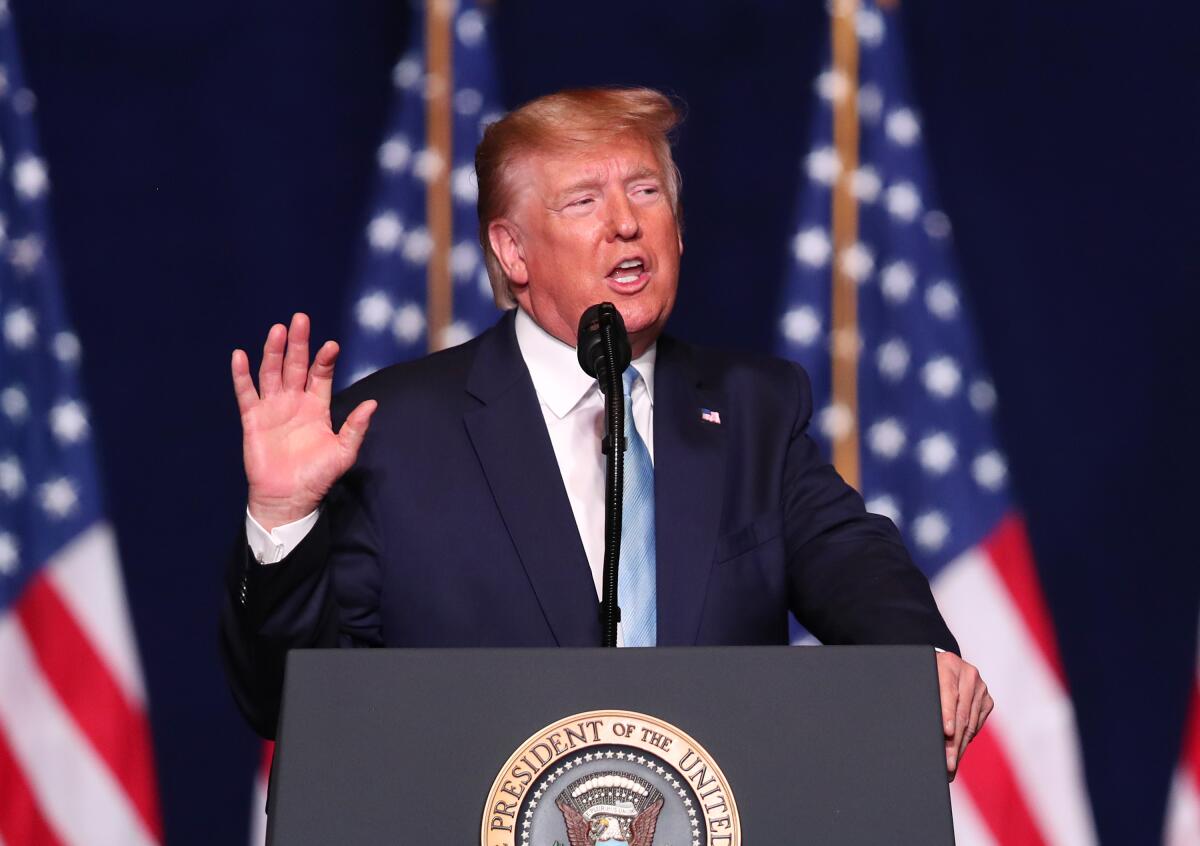
The U.S. missile strike that killed Iranian Quds Force leader Qassem Suleimani was a stunning escalation of the conflict between the United States and Iran — an act of open war in a struggle that has been carried out in the shadows for decades.
Yet President Trump and his aides oddly called the airstrike a “deescalation,” as if it were a step toward peace.
“We took action last night to stop a war. We did not take action to start a war,” the president told supporters Friday.
Iran won’t abide by nuclear deal limits after U.S. killing of Qassem Suleimani, reports say
Iran said Sunday it would no longer abide by any of the limits of its unraveling 2015 nuclear deal with world powers after a U.S. airstrike killed a top Iranian general in Baghdad, ending an accord that blocked Tehran from having enough material to build an atomic weapon.
The announcement came Sunday night after another Iranian official said it would consider taking even-harsher steps over the U.S. killing of Gen. Qassem Soleimani on Friday. Hundreds of thousands of people flooded the streets Sunday in Iran to walk alongside a casket carrying the remains of Soleimani, the former leader of its expeditionary Quds Force that organizes Tehran’s proxy forces in the wider Mideast.
Suleimani’s body arrives in Iran as Trump issues new threats
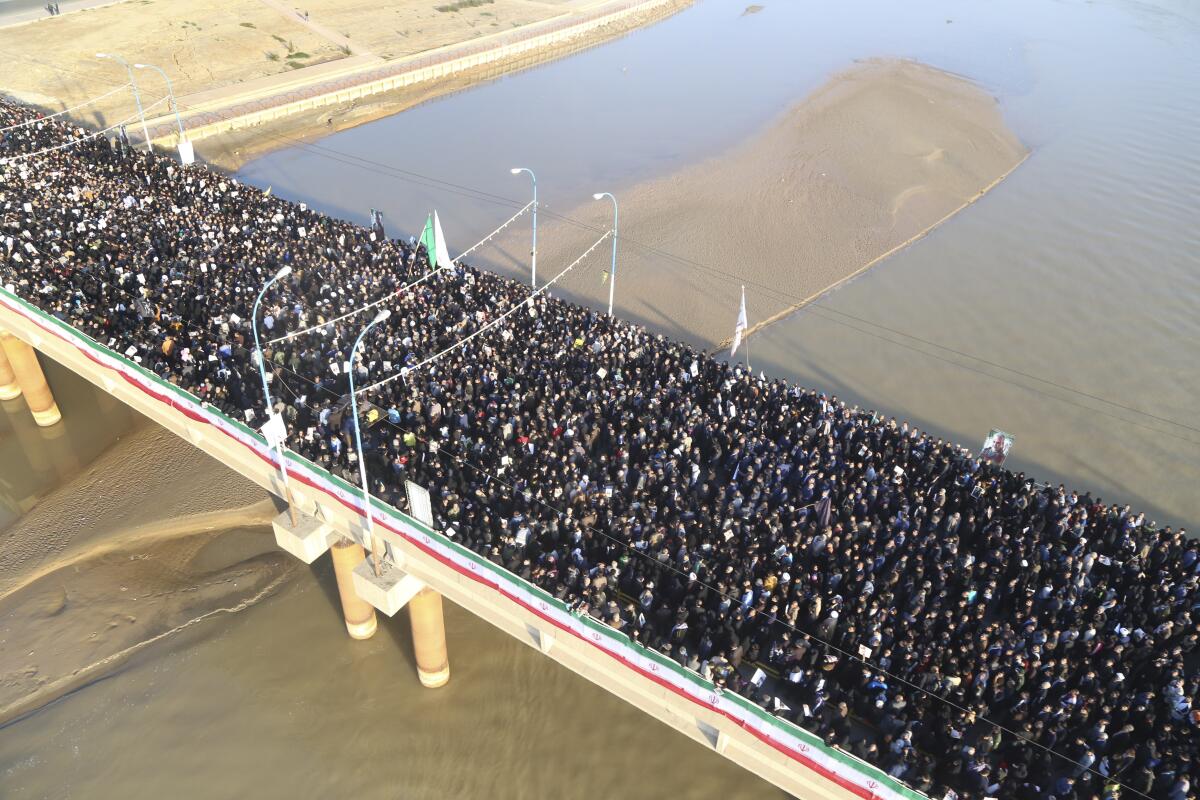
The body of Gen. Qassem Suleimani arrived Sunday in Iran, where thousands of mourners thronged his coffin ahead of a grand funeral procession across the Islamic Republic amid soaring tensions between Iran and the U.S.
President Trump has threatened to bomb 52 sites in Iran if it retaliates by attacking Americans.
Iraq’s parliament votes to expel U.S. military from the country
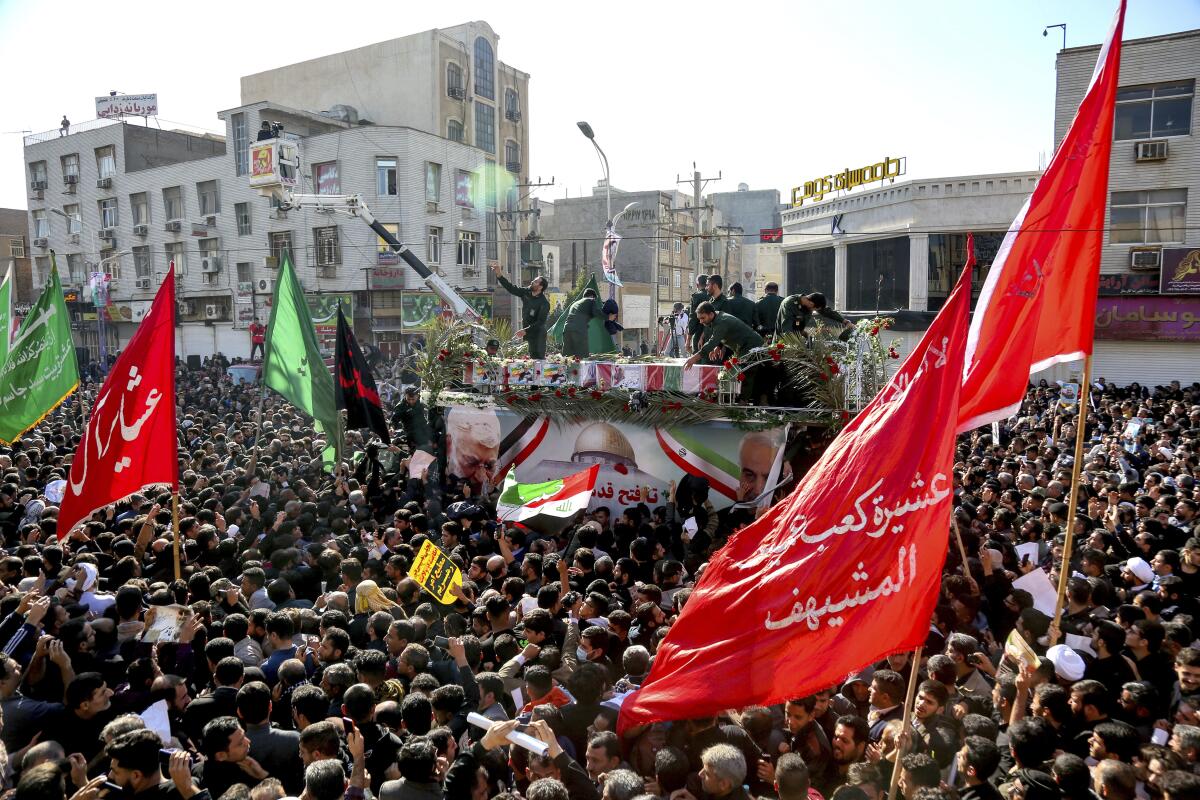
Iraq’s parliament voted on Sunday to expel U.S. troops from the country, in an extraordinarily rapid and decisive response to the Trump administration’s targeted killing of a top Iranian general at the Baghdad airport on Friday.
The preliminary vote could result in the removal of more than 5,000 U.S. soldiers and unspecified number of contractors stationed in the country. After invading Iraq in 2003 and ousting Saddam Hussein, the United States maintained a troop presence in the country as it was besieged, first by civil war and then by the murderous insurgency of Islamic State. All the while, Iran’s influence in Iraq — both countries are largely Shiite Muslim nations in a region dominated by Sunni Muslim — continued to grow.
With tensions rising, new focus emerges on Americans jailed in Iran
For Joanne White, the mother of an American citizen from San Diego who is imprisoned in Iran, the last year and a half already felt like an unceasing nightmare. But things just got worse.
With tensions rising between the U.S. and Iran after President Trump’s targeted slaying of Gen. Qassem Suleimani — one of Iran’s highest-ranking officials — White’s concerns over the safety of her son, Michael, a U.S. Navy veteran, have intensified.
“I’m totally depressed. With all this stuff with Iran and the U.S., I don’t know if [the U.S. government] is able to negotiate his release,” she said in a phone interview with The Times. “Tensions have already been bad.”
Amid rising tensions with Iran, hundreds rally against war in downtown L.A.
An anti-war march and demonstration was held Saturday in downtown Los Angeles calling on the U.S. not to go to war with Iran and to pull troops out of the Middle East.
The demonstration held in Pershing Square came in response to the recent U.S. killing of a top Iranian commander in Baghdad, which has increased tensions between the United States and Iran. At least 200 people held up signs such as “No War or sanctions on Iran...” and “U.S. out of Iraq.”
Protesters also marched through downtown Los Angeles, chanting “No more war.”
Iran general steps out of Suleimani’s shadow to lead Quds Force
A new Iranian general has stepped out of the shadows to lead the country’s expeditionary Quds Force, becoming responsible for Tehran’s proxies across the Mideast as the Islamic Republic threatens the U.S. with “harsh revenge” for killing its previous head, Qassem Suleimani.
The Quds Force is part of the 125,000-strong Revolutionary Guard, a paramilitary organization that answers only to Iran’s Supreme Leader Ayatollah Ali Khamenei. The Guard oversees Iran’s ballistic missile program, has its naval forces shadow the U.S. Navy in the Persian Gulf and includes an all-volunteer Basij force.
Like his predecessor, a young Esmail Ghaani faced the carnage of Iran’s eight-year war with Iraq in the 1980s and later joined the newly founded Quds, or Jerusalem, Force.
More U.S. troops deploy to Mideast amid tensions with Iran
Hundreds of U.S. soldiers deployed Saturday from Ft. Bragg, N.C., to Kuwait to serve as reinforcements in the Middle East amid rising tensions following the U.S. killing of a top Iranian general.
Lt. Col. Mike Burns, a spokesman for the 82nd Airborne Division, told the Associated Press 3,500 members of the division’s quick-deployment brigade, known officially as its Immediate Response Force, will have deployed within a few days. The most recent group of service members to deploy will join about 700 who left earlier in the week, Burns said.
A loading ramp at Ft. Bragg was filled Saturday morning with combat gear and restless soldiers. Some tried to grab a last-minute nap on wooden benches. Reporters saw others filing onto buses.
As Iraq reels from U.S. strike, its politicians turn against Washington
The crowd thronged around the two coffins, one draped in the Iraqi tricolor and the other wrapped in the red, white and green of the Iranian flag. Behind them, thousands trudged alongside a procession of trucks, chanting, “There is no god but God, and America is the enemy of God.”
Among those at the fore in Baghdad’s Hurriya Square on Saturday morning were Iraqi government officials once considered friends of the U.S.: Adel Abdul Mahdi, Iraq’s caretaker prime minister; Nouri Maliki, a former longtime prime minister pushed into power by Washington; and Faleh Fayyad, who met with U.S. Defense Secretary Mark Esper in October. They and other Iraqi politicians were in attendance to mourn those killed Friday in a targeted U.S. drone strike near Baghdad’s international airport.
Their presence was but one measure of the anger raging through Iraq’s leadership class in the aftermath of the attack ordered by President Trump to kill Iranian Maj. Gen. Qassem Suleimani, the commander of Tehran’s elite Quds Force and mastermind behind Iran’s regional military strategy. Also slain were Abu Mahdi Muhandis, the deputy head of a bloc of Iran-backed Iraqi militias, and several others.
Across California, Iranian Americans are shocked, alarmed or relieved at the killing of Qassem Suleimani
Farid Khanlou rearranged a basket of Persian cucumbers in his market in the heart of Tehrangeles on Friday morning as he reflected on the assassination of Gen. Qassem Suleimani, one of Iran’s highest-ranking officials.
He’d first heard the news at Jordan Market, on Westwood Boulevard, where customers whispered Suleimani’s name, saying he’d been killed, while wandering the aisles late Thursday. Was it the U.S., they wondered?
When Khanlou, 63, got home that night, he flipped on the TV and tuned in to the BBC. By then, the Pentagon had taken credit for the attack. He rushed to tell his mother-in-law, in town visiting from Europe.
Thousands in Baghdad mourn Iranian general killed by U.S.
Thousands of mourners gathered Saturday for a funeral procession through Baghdad for Iran’s top general and Iraqi militant leaders killed in a U.S. airstrike that has caused regional tensions to soar.
Gen. Qassem Soleimani, the head of Iran’s elite Quds force and mastermind of its regional security strategy, was killed in an airstrike early Friday near the Iraqi capital’s international airport.
Iran has vowed harsh retaliation, raising fears of an all-out war. U.S. President Trump says he ordered the strike to prevent a conflict. His administration says Soleimani was plotting a series of attacks that endangered American troops and officials, without providing evidence.
Pence falsely links Iranian general to 9/11 attacks
On Friday afternoon, Vice President Mike Pence took to Twitter to justify the targeted U.S. attack that killed Iranian Gen. Qassem Suleimani.
But scholars say his tweets contain several inaccuracies, including an allegation that appeared to link Suleimani to the Sept. 11, 2001, attacks.
In that tweet, Pence wrote that Suleimani “assisted in the clandestine travel to Afghanistan of 10 of the 12 terrorists who carried out the September 11 terrorist attacks in the United States.”
U.S. officials vow to increase security after airstrike kills Iranian general
Many U.S. residents admitted some concern Friday, but little alarm, over what danger the country might encounter because of the killing of Iran’s top general in a U.S. airstrike.
Several shoppers at Seattle’s Pike Place Market said they were following news concerning the death of Iranian Gen. Qassem Suleimani early Friday near Baghdad’s airport. But none of them described taking precautions or changing routines, even after Iran’s Supreme Leader Ayatollah Ali Khamenei warned that a “harsh retaliation is waiting” for Americans.
Some people said the problems in the Middle East felt far away and less pressing than other issues, such as local crime.
How Trump made the decision to kill Suleimani
When President Trump’s national security team came to his Mar-a-Lago resort in Florida on Monday, they weren’t expecting him to approve an operation to kill Gen. Qassem Suleimani.
Secretary of State Michael R. Pompeo, Defense Secretary Mark Esper and Gen. Mark Milley, chairman of the Joint Chiefs of Staff, had gone to Palm Beach to brief Trump on airstrikes the Pentagon had just carried out in Iraq and Syria against Iranian-sponsored Shiite militia groups.
One briefing slide shown to Trump listed several follow-up steps the U.S. could take, among them targeting Suleimani, the head of the Islamic Revolutionary Guard Corps’ elite Quds Force, according to a senior U.S. official familiar with the discussions who was not authorized to talk about the meeting on the record.
Wag the dog? Not yet. Democrats so far keep Trump’s Iran attack out of impeachment debate
When President Clinton launched a series of military strikes in Sudan, Afghanistan and Iraq in 1998, critics quickly denounced the moves as cynical, political attempts to distract Americans from his impeachment.
They pointed to the 1997 movie “Wag the Dog,” in which a president embroiled in a sex scandal stages a fake war with a tiny country to change the national conversation.
Before entering politics, Donald Trump as a private citizen several times predicted — incorrectly — that President Obama would resort to a similar strategy. “In order to get elected, @BarackObama will start a war with Iran,” he tweeted in late 2011, making a similar statement in 2012.
Oil prices jump after U.S. kills Iranian general; California gas prices may follow

Crude oil prices jumped in response to the United States’ targeted killing of Iran’s top general, and California drivers could see gasoline prices climb too, a fuel analyst said Friday.
California likely will see only a modest rise in gasoline prices in the short term, said Patrick DeHaan, head of petroleum analysis at fuel-tracking site GasBuddy.com. “There may be a very slight uptick of several cents a gallon,” he said. “Call it 5 cents a gallon. But it may take a week or 10 days.”
Prospects for even higher pump prices could grow, however, if Iran carries out threats to retaliate and crude prices climb further on fears that the tensions could disrupt the global flow of oil, DeHaan said.
Israel had advance notice of U.S. plan to kill Iranian general Suleimani, report says
Israel had advance notice of the U.S. plan to kill Iranian military leader Gen. Qassem Suleimani, Israeli military and diplomatic analysts reported Friday night while refraining from providing further details due to heavy military censorship.
“Our assessment is that the United States informed Israel about this operation in Iraq, apparently a few days ago,” Barak Ravid, a journalist and commentator with deep sources in the Israeli security establishment, said on Channel 13.
Iranian Americans, what do you think about the killing of Iranian Gen. Qassem Suleimani?
Los Angeles has one of the largest populations of Iranians outside of Iran, so we want to know how those with ties to the region are handling the news. If you’re Iranian American or have family in Iran or Iraq, tell us what you’re feeling and what questions you have about the killing of Suleimani.
To be clear, we care about the opinions of all our readers, but for this article, we are focusing on the members of the Iranian diaspora, given how directly affected they are by the geopolitical crisis.
Who was Qassem Suleimani, and what does his death mean for the U.S.?
The U.S. airstrike ordered by President Trump that killed Gen. Qassem Suleimani, the powerful and shadowy head of Iran’s elite Quds Force, marks a major escalation in U.S.-Iran tensions and raises concerns about renewed conflict in the Middle East.
Here’s what you need to know about Suleimani, his role in the region and what his death means for the U.S.
Trump says he ordered the strike that killed an Iranian general ‘to stop a war’
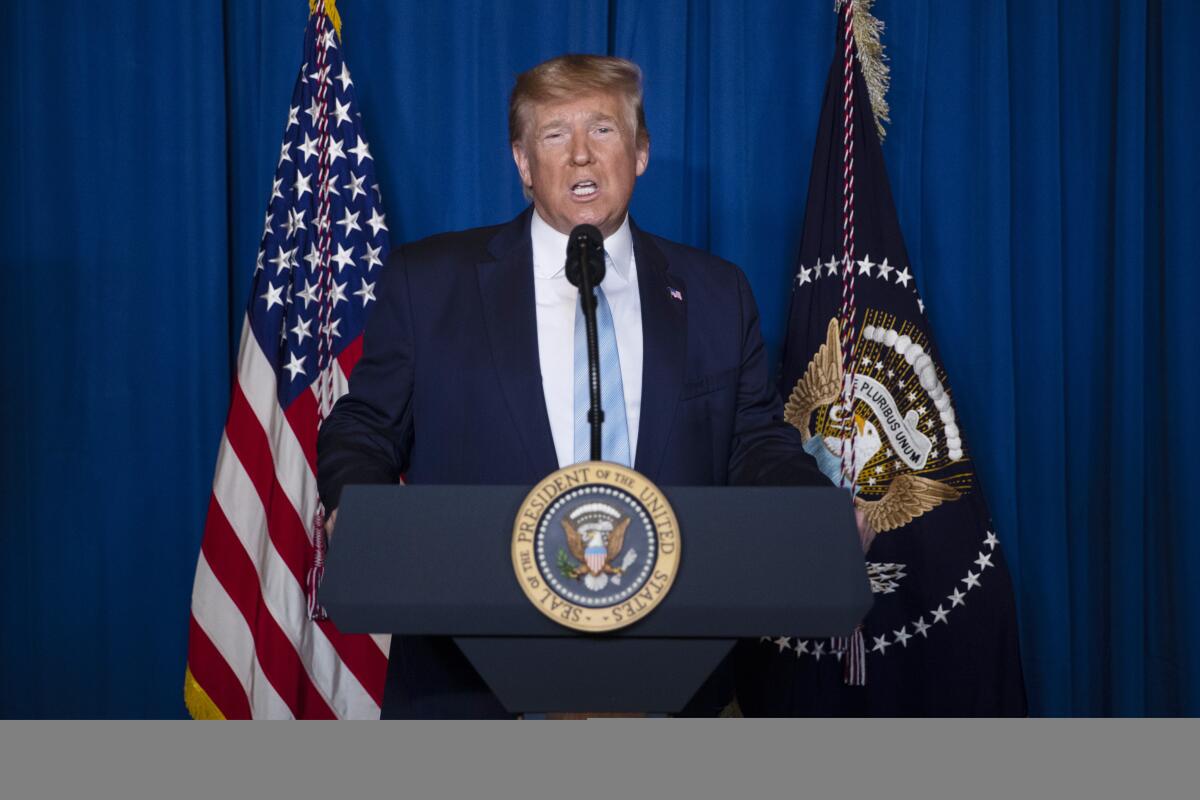
President Trump said Friday that he ordered the drone strikes that killed Iran’s top military leader to prevent future attacks against Americans.
“We caught him in the act and terminated him,” Trump said, adding that “we take comfort in knowing his reign of terror is over.”
Trump rejected concerns that his decision to kill Gen. Qassem Suleimani, head of Iran’s elite Quds Force, would draw the U.S. into a wider conflict in the Middle East.
Targeted killing of Iranian general threatens to seize American political debate
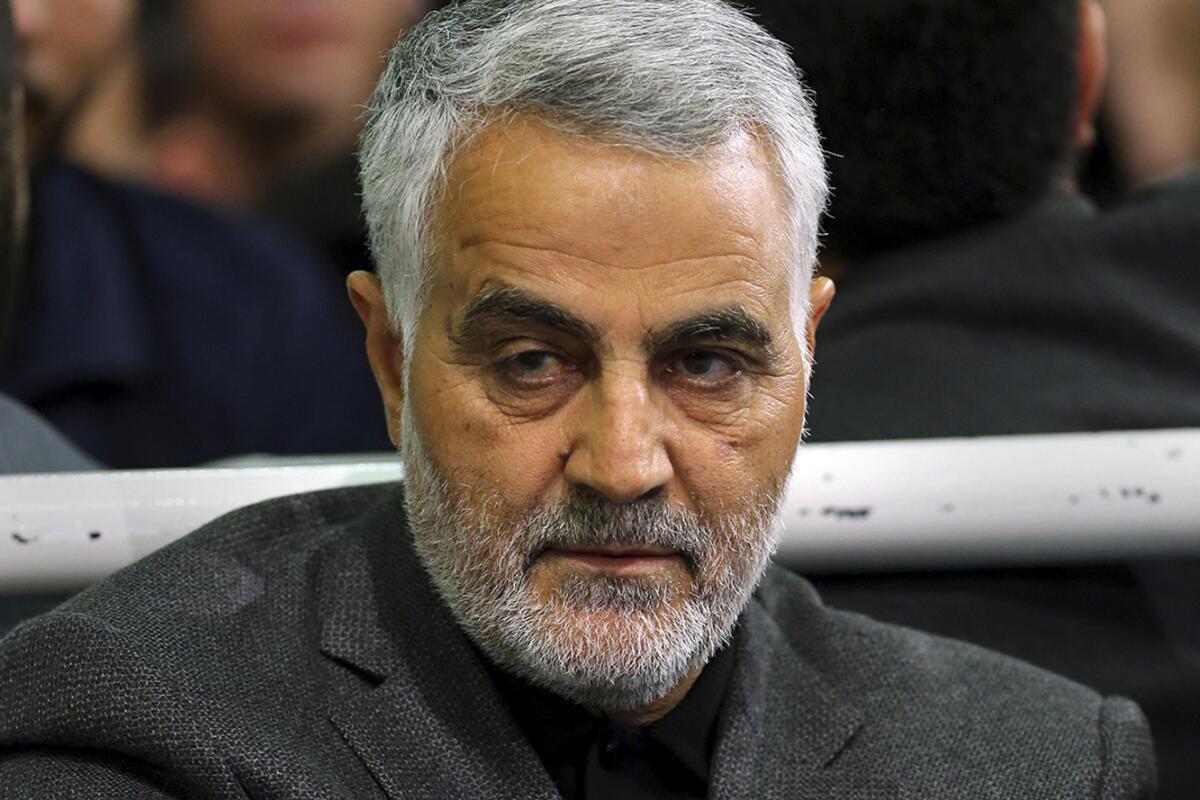
The targeted killing of Iranian Gen. Qassem Suleimani by the U.S. is likely to dominate the political debate Friday on Capitol Hill and elsewhere over whether the action amounted to an act of war and if President Trump had the authority to undertake it without congressional approval.
Those questions will play out over the coming weeks, just as Democrats are discussing when to forward articles of impeachment against Trump to the Senate amid a standoff over how a trial will be conducted.
‘A more dangerous world’: Killing of Iranian general triggers global alarm
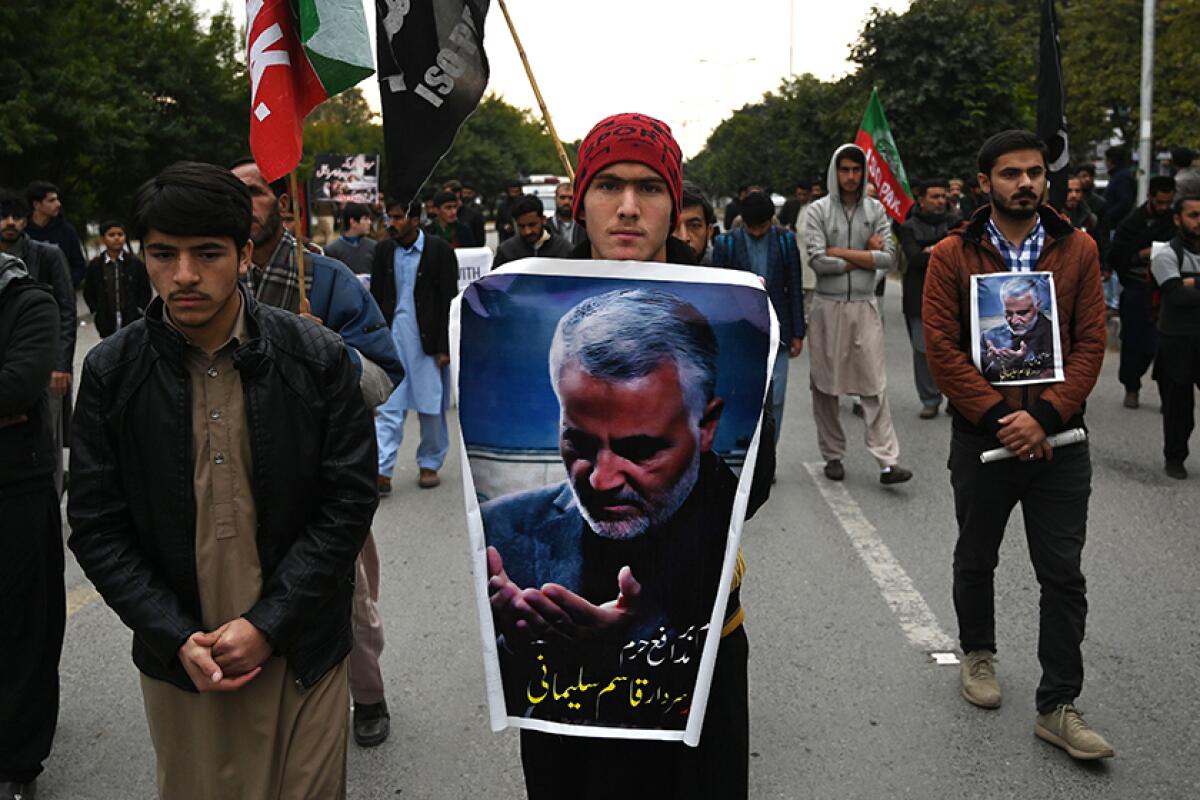
Global powers warned Friday that the world has become a more dangerous place and urged restraint after the U.S. assassinated Iran’s top general, although Britain and Germany also suggested that Iran shared blame for provoking the targeted killing that dramatically ratcheted up tensions in the Mideast.
China, Russia and France, all permanent members of the U.N. Security Council, took a dim view of the U.S. airstrike near Baghdad’s airport early Friday that killed Gen. Qassem Suleimani.
The White House said in a tweet that Suleimani, who led the elite Quds Force responsible for Iran’s foreign campaigns, “was actively developing plans to attack American diplomats and service members in Iraq and throughout the region.”

